THE ESSENTIAL GUIDE TO TRINIDAD AND TOBAGO CARNIVAL


THE ESSENTIAL GUIDE TO TRINIDAD AND TOBAGO CARNIVAL

ARE YOU FIT FOR CARNIVAL?
Play Mas recommends WHERE TO FETE
CHARACTERS OF THE TRADITIONAL CARNIVAL
By Michael Anthony2006 PORTRAYAL PEEK
With contact information
CITY MAP
 B. De Peaza
B. De Peaza
been described as the Greatest Show on other countries, integrating and establishing we are now known for our hospitality here. Every year
season climaxes on Monday 27 and ebruary 2006, for that is when thousands of revellers take to
Whether you are going to be here as a spectator or a masquerader, our preThe Essential Guide to Trinidad and experiencing the best that this marvellous and dancing, culinary treats and native

and handy, before, during and even after with the destinations, events and advice your stay a very memorable one. Our statistics and draw you into the swirling whose history has produced a truly visit and welcome you heartily, on behalf Republic of Trinidad and Tobago.
Vishnu Dhanpaul President (Ag) Tourism Development Company LimitedU.S. Citizens/ European Union Residents
Tourist or Business Travel:
• Passport must be valid for 3 months longer than you intend to stay in the countr y.
•You must have tickets and documents for return or onward travel.
• No Visa is required for U.S. Citizens or European Union residents to stay up to 3 months. If, however, you wish to travel to Trinidad and Tobago for any other reason – e.g.: e mployment, a doption, study, immigration – or you stay longer than the 3-month time period, please contact your embassy
•You will need a vaccination certificate for Yellow Fever if you are arriving from an infected area within a 5-day time period.
Non-U.S. Citizens/ European Union Residents
Tourist Travel
• Passport must have 6 months validity remaining.
•2 Visa Application Forms, completed and signed.
•2 passport-size photographs, taken within the last 3 months.
• Copy of airline tickets denoting round trip airfare.
• If a permanent resident of the U.S.A., a photocopy of your Green Card.
General Guidelines
Because of historical ties and/or bilateral agreements between Trinidad and Tobago and several other countries, citizens of certain countries do not need visas once they are travelling to our twin islands on vacation, as follows:
• The USA and European Union countries (as mentioned above).
• Commonwealth countries w ith the exception of Australia, India, New Zealand, Nigeria, Papua New Guinea, Sri Lanka, Tanzania, Uganda, South Africa. Citizens of Countries that have visa agreements with Trinidad and Tobago, i.e.: Turkey, Nor way, Switzerland, Israel, Brazil, Colombia, South Korea – once citizens are visiting as tourists for no longer than 3 months.
• Citizens of Venezuela arriving directly from Venezuela on vacation for 2 weeks or less.
• Citizens of Suriname, Martinique, Guadeloupe, French Guiana, and The Netherlands Antilles.
• All holders of OAS passports.
• Seamen and airline crew regardless of nationality, who are arriving in the countr y to join their ships, or are in transit to meet their airline for a return trip.
• Holders of UN passports do require visas.
• Holders of Diplomatic passports are not automatically exempted from visas, so to be sure, contact your nearest Trinidad and Tobago Consulate or Diplomatic Mission.
Leading and reputable car rental companies are listed in the Yellow Pages of the Trinidad and Tobago Telephone Director y. To drive in our beautiful islands, you will need
a valid international driver’s permit or a permit that is issued in:
The Bahamas, Canada, England, France, Germany or The United States of America
This permit can be used for 90 days. Gas (Petrol) stations are easily found in the towns and main thoroughfares but are a little more difficult to find in the rural areas. National Petroleum or ‘NP’ is the most common brand of gas station you will find here. Don’t forget – we drive on the left!
If driving is not your speed, you can always hop a bus or a taxi. In Trinidad, the main bus terminal is at ‘City Gate’, located at South Quay in the capital city of Port of Spain. Commuter ser vices run between the capital city and areas like Arima, Chaguanas, Chaguaramas, San Fernando and Sangre Grande. Schedules may change, so you should call to confirm the day’s agenda at (868) 623-7872. In Tobago, buses do not cover all the areas of the island. It would be in your best interest to rent a car if you wish to do some serious exploring.
Private taxi companies are also listed in the phone book and many of them use left-hand drive cars, which may make you more comfortable if you are not accustomed to driving on the ‘wrong’ side of the road! Most of these companies have fixed fares for specific distances. If you want to feel like a Trinbagonian then tr y public transportation. You will find both cars and minibuses, or as we call them ‘maxi-taxis’ working certain routes. The ‘maxis’ all have a different coloured stripe along the vehicle’s body that is representative of the route they are covering:
Yellow – Diego Martin and the Port of Spain area Red – Arima and other eastern towns Black – Princes Town Green – South Trinidad Brown – South into South West Trinidad, towns like Penal and Point Fortin Blue – Tobago
How do you find the main ‘Maxi Taxi’ congregation points for different routes? (see Map)
• For those heading west along Wrightson Road – you will find a terminus at the corner of South Quay and the start of the Beetham Highway
• For those heading west into St. James and Carenage –go to ‘Green Corner’ (the corner of Park and St. Vincent Streets in downtown Port of Spain).
• For those heading east and south – go to the ’City Gate’ terminus along South Quay
• For those heading into Maraval – go to Charlotte Street (between Park and Oxford Streets) in uptown Port of Spain.
•You will recognise any taxi by its number plate, which always starts with the letter ‘H’, meaning, ‘hired’. There are no set stop-off or pick-up points, so don’t worr y –you can be picked up anywhere along their route. On the other hand, rental cars are labelled ‘R’.
Our islands are beautiful – and relatively safe – but just like anywhere else in the world, you’ve got to be aware! Just use your good judgement!
• Always lock your doors, whether you are in your hotel room, in a car or taxi.
• Never leave your valuables unattended, especially in cars or on beaches – or flaunt them in such a way as to make yourself an easy target.
• Do not travel alone at night, especially along poorly lit areas, deserted beaches or scenic lookouts.
• If you are in doubt about an area in which you are staying or travelling, ask – get advice from the hotel staff or call your embassy
• When travelling, especially from the airport to your destination, use an accredited taxi. You can ask for details on accreditation at the information booth at the airport.
•Trust your instincts – if something doesn’t feel right, it probably isn’t.
• The Emergency Number 999 will reach the Police Rapid Response Unit.
There are free health care facilities throughout Trinidad and Tobago; or you can choose a private facility for your convenience.There are also many private ambulance ser vices that can rush to your assistance – look under “Ambulance” in the Yellow Pages or call 990. The 990 number is also used to reach the Fire Ser vices.
• Be aware of the difference in driving conditions when using our roads.
•Wear your seatbelt – it’s the law and it saves lives.
• Many of our drivers still use hand signals to communicate when turning or stopping – be alert!
• Be especially mindful of taxi drivers – since there are no designated pick-up or drop-off points, they usually pull aside anywhere for passengers – drive a safe distance behind them.
•Trinbagonian drivers are generally courteous, but be attentive and drive defensively
• When buying food, ensure that it is a reputable establishment and that the vendor has a valid Food Badge.
• If you are in doubt, walk out – Trinidad and Tobago is so full of good restaurants and roadside cafes that you do not need to settle for a poor or unhealthy standard of food.
• Err on the side of caution – if your stomach is unaccustomed to spicy or tangy foods, take it easy until you get more used to our local culinar y fare.

 Michael Anthony
Michael Anthony
The characters of the traditional Carnival are the figures which evolved when the Carnival was introduced to Trinidad by the Creole French. In other words, this is not speaking of the characters of bands, which are planned and designed.
When Carnival was brought to Trinidad as a result of the Cedula of Population of 1783, which led to a mass immigration of French Caribbean settlers into Trinidad, Carnival had already taken a definite Caribbean form, for these immigrants who had come from islands like Martinique, Guadeloupe, San Domingue, and even from Grenada, (which was then British), had already settled in the Caribbean for many decades. Nevertheless, their Carnivals reflected the traditions of their French past as well as the strong influences of the life they had lived here for generations — the plantation life and its contact with African slavery.
Perhaps the first character to look at should be the Pierrot, not the Pierrot Grenade, who is a very different and rough character. The Pierrot comes to us just as he was in the France of old, an elegant character. Originally he was a dandy in fluffy white in the old French pantomimes. With the French in the Caribbean he did not remain the character in fluffy white, but his garment was made more colourful and he became the beau of the Creole French Carnivals. This was one of the characters that was always portrayed, was admired by the African slaves who stole glimpses of the Carnivals in the great houses of the estates, and w ho, after slavery, was imitated by these slaves in the Carnival of the Streets.
The name Pierrot Grenade seems to suggest that this w as a variation (o r version) of the Pierrot which came out of Grenada — La Grenade to the French. The originators of the Pierrot Grenade made no concessions to elegance, but seemed to have thought a great deal about self-defence, for within the Pierrot Grenade’s costume of rags and sackcloth there were all sorts of protection, and indeed, under the part of the costume covering the head was, usually, an iron pot!
And well was this so, for the Pierrot Grenade, who carried a whip or stick, had
a clear-cut role, which was to beat into submission any other Pierrot Grenade who he met in the way
Although the Pierrot Grenade became a figure of the Trinidad Carnival, he was not so prominent in some areas probably because there were some Carnival characters infinitely more popular, whose profession, during the Carnival, was to burst each other ’s heads. Their weapon was a smooth, well-prepared knotted stick, preferably of poui. In fact, they used poui so frequently that the word “poui” became another name for the blow of a stick.
These stickmen never paraded or found themselves in the mainstream of Carnival, but were there mainly for the purpose of “playing stick.” Mainly the stick-playing would be held in the area in front of a liquor shop, and the proprietor would usually offer liquor prizes for the stickmen who could draw blood. There were two main factors which led to their popularity Firstly, the drama of the prospect of two men “carraying” in a ring — a ring formed by curious spectators — with the prospect that there would be the flow of blood. And the second big attraction was the dramatic drumming and tensionbuilding songs w ith which drummers would accompany the contest. These songs were called “calindas,” and it is said the chanters could heighten tension to
such a pitch, and the drummers, also chanting, could send a message to the stickman of their choice as to the instant there was an opening. That signal could very often determine the outcome of a contest.
There were certain areas of Trinidad where stick-playing was such an integral part of the celebrations that there could hardly be a satisfactory Carnival without it. Villages such as Mayaro, Guayaguayare and Moruga had a reputation for their stickmen. In t he 1930s and 1940s stickmen such as O’ Farrell of Grand Lagoon, Mayaro and R afael of Pierreville, Mayaro were known far and wide. Indeed, many of the calindas of the time, like “O’Farrell, O’ Farrell!” w ere composed on some of these stickmen.

Although it was the immigrants from the French Caribbean who introduced Carnival into Trinidad, stick-playing was one thing they had nothing to do with. Stick-playing came directly from Africa, although it must have been somewhat modified in Trinidad.
Another Carnival character that came directly from Africa and had to do neither with the French culture of Europe nor of the Caribbean, was the character of
continued on page 8
from page 7
Moko Jumbie. In its African context Moko Jumbie could not have been a ‘carnavalesque’ figure but a figure related to one of the rituals of the dead. The significance of this solemn, ceremonial figure walking on stilts is completely lost to us, but the appearance of Moko Jumbies in the early Carnivals daubed in the black and white paints of ritual mourning, depicts, it is held, the journey of the spirit of the dead.
In t he riotous m asquerades of th e 1840s, when Carnival was celebrated by the m asses for the first time, the appearance of the Moko Jumbie caught the eye. The term “jumbie” which is known as “zombie” in the United States and Jamaica, means “spirit” or “soul” of t he dead. Charles Day, an English traveller, who was in Trinidad for the Carnival of 1848, appears to have seen such a character, and was quite fascinated by it.
Yet another traditional character of the Trinidad Carnival that has nothing to do with those who brought the Carnival here, and at the same time has nothing to do with Africa, is the Wild Indian. Indeed, the Wild Indian character may be the only one of the traditional Carnival characters that could be said to have been born in Trinidad.
It was a common thing for members of the Guarahoon tribe of Amerindians to cross over in boats from Venezuela and come to Trinidad, and this may have been the case even before Columbus passed by. Indeed, the Amerindian name for Trinidad was Kairi, meaning the island close to the continent, and since Trinidad was home to several tribes of Amerindians it is not surprising that the Guarahoons came here frequently Even as late as the turn of the 19th century and probably later — Guarahoons were known to come here, trading in such things as dogs, monkeys, parrots, plantain, beads, and the like. Sometimes
they landed at San Fernando, but they often landed at Moruga, and walked up to Princes Town, where there might have been many of their kind, for Princes Town had been an Amerindian Mission, and was known by the name of “Mission,” until this changed in 1880.
After landing at Moruga the Guarahoons would pass through Pr i nces To wn , where there were great prospects for trade. And maybe it was after they stayed there a little while they would take the Manahambre Road to San Fe rnando. ( Not much is known of Manahambre but he is thought to have been an Amerindian chief). Anyway, the land route of the Guarahoons from Moruga to Princes Town was named after these Amerindians: hence Indian Walk
Charles Day, the English traveller who watched Carnival in 1848 and wrote about it, declared of people imitating these Guarahoon Indians in a band. He said: “ The best embodiments were the Indians of South America, daubed in red ochre, personified by the Spanish peons from the M ain — themselves half –Indian. Many of these had Red Indian quivers and bows…”
It can be assumed the Guarahoon or “Wild Indian” was imitated and brought into the Carnival even before 1848.
These Guarahoon Indians were very colourful in their way They walked in single file, when they were happy they danced, in their own Amerindian style, at times they sang and chanted, and they walked with long staves. Their unexpected appearances so impressed themselves on the Trinidadian way of life, especially in the south, and they had such a reputation for wandering, that it was a common thing, up to about the mid-1950s, to hear a mother scolding her truant and carefree child with the words: “You is a Guarahoon?”
It must have been from the very start of the Carnival of the Streets in 1840 that when that festival was approaching, groups got together to imitate th e Guarahoon Indians. One hundred years

later the author of this article was fascinated with the depiction of these “Wild Indians.” The masqueraders imitated the way of dress — a bodice red with roucou (or ochre) and strung with beads, with a short roucou-stained skirt. They had long hair hanging in plaits at the side of their cheeks, and long staves, and in parading in the streets they walked in single file. When they met a curious crowd and wanted to put on a display, they danced around in a ring and sang what sounded so much as a genuine Guarahoon song. The song might be “Gran falia, katuama, Kat, kat, kat ai kobie Gran falia katuama……..”
Or it might be “Mama dywok salvacota enaim,” or one of dozens of songs composed by them — or could they have been genuine Guarahoon songs? These Wild Indians have come right down to our times, but since the Guarahoons are no more, at least as “Wild Indians,” the Wild Indians in the Trinidad Carnival seem to be disappearing fast.
The Bat is an old and intriguing masquerade although it is hard to say when it entered the Carnival. It seems though that from the 1920s, at a time when the vampire bat was causing a lot of concern, the figure of the bat became common at the Carnival.
It is quite common for people to have their favourite costumed character, and for a great number of people the favourite is the Bat.
Gorgeous in silvery black outfit (on occasions brown) and resplendent weblike wings, which are always kept open — and why not? For they are the glory of the costume — the figure of the Bat in a band is always greatly admired. Also, the people who portray Bats take their portrayal very seriously. They never jump up with abandon, for Bats are never seen in that light. They make their dainty, timid-like steps, and blow their shrill little whistle, softly
continued on page 10


At Yara Trinidad Ltd., we are partnering with communities for sustainabl e growth, through our ongoing suppor t for education, best safety practices, environmental care and our culture.



from page 8
But as one would expect, Bats avoid bands. Because of their large, delicate costumes they also keep away from the centre of crowds.
Another thing which characterises Bats is the fact that they are often in a little group, and several such groups are known to number members of the same family. One of the well-known Bat-portraying families of recent times is the Bartholomews.
These families who portray bats seem to have become rarer as we enter the first decade of the 21st century, but one is hoping that the Carnival never deserts Bats and bats never desert the Carnival.
Midnight Robber might well be carrying a coffin in his hand or as part of his headwear, and there might well be a dagger or two around his waist. Maybe one of the most disconcerting things about the Midnight Robber — apart from meeting him in broad daylight — is his manner His stalking walk, his long strides around you, the cry: Wherever I stand I stand most predominate, whenever I speak I hear the thunder roll…
Many adults have quaked in their boots during such an encounter. Many a fainthearted child has been sent running, screaming down the street.

The Midnight Robber has been known to appear in brown or red costumes but his normal apparel is black, for he can easily sneak up on you at midnight, quite unseen.
One is not sure where he comes from or at what time he entered the Carnival, but if you listen to his speech, all these things might be revealed.
The Midnight Robber, discreetly blows his whistle at all times but this is not to alert you that he is fading from the scene. No, unlike some of the other traditional Carnival characters, he is not. And he has done so well, thanks to his robberies in broad daylight, that most times he enters the Carnival with his treasure chest.
did not justify children running and screaming in fear Although of course, it is true to say that when two different groups of Jab- Jabs met it was like all hell let loose. And in the confrontation real blows would be shared, with the whip cracking on all parts of the body, especially the head, and with the fainthearted spectator fleeing from the scene with horror But never fear Under his costume the Jab- Jab is protected from head to toe.
In his display, the Jab- Jab refers to his whip as “rope and twine,” but one suspects it contains a lot more than rope and twine.
The Jab- Jab moves around in groups of three or four, stalking his “enemies,” other Jab- Jabs. He announces his entry on the scene by cracking his whip on the pitch road, a noise which sounds somewhat like rifle fire.

There is something forbidding, yet extremely charming about this traditional “old-time” character and one hopes that the Carnival continues to hear the rifle fire of his rope-and-twine.
“Stop! Stop! My man, who authorised you to go into the land of my father ’s treasure…I will cut your neck and drink your blood, I will make soup with your bones…”
With words as frightening as these the Midnight Robber is apt to greet you. The broad-brimmed hat he is wearing, with the skull and crossbones, is doing just what it is meant to do - intimidate you.
To make you feel reasonably sure that that Carnival day would be your last, the

The Jab- Jab, as known in the Carnivals before the Second World War, is not only a traditional character but may well be called an old-time character. Dressed in a red-and-yellow costume with hornlike tassles on a plain head-piece, and carrying a supple plaited whip, the JabJab was a very familiar figure up to the banning of Carnival in 1942. When the first peace-time Carnival came in 1946 the Jab- Jab returned but in less numbers and the general trend in Carnivals since the war to have less “old masq” characters, affected this much feared type of masquerade.
But the Jab- Jab, despite his “ fiery ” costume, and even more fiery display,
The Jab Molasses, or in the normal Patois expression “Jab Malassay ” (jab malassé) is one of the earliest forms of devils at the Carnival. Indeed, at the Carnival of 1848 the English writer, Charles Day, saw them, and he must have tried to describe them while keeping clear These were creatures
continued on page 46
Devil Mas is one of the most popular forms of tr aditional mas in Trinidad and Tobago. Known as Jab Molassie from the union of the Patois words for “devil” and “molasses”, these masquer aders come out in short pants, wire tails, horns, pitch forks and sometimes masks, painting themselves in red, green or blue paint, mud or grease. Any spectator (especially one in a temp ting canvas of all white clothing) that crosses the path of a Jab Molassie band will pay the price of getting their clothes smeared in the ink of the devils’ choice. In the midst of it all, the Devil himself is there waiting to write more souls into his “Book of Life” (or death).

After the creatures of the night go in from J’ouvert, the pretty mas begins. On Carnival Monday morning, some of the tr aditional portr ayals take to the streets, with familiar costumes such as Minstrels, Midnight Robbers, The Bat, Wild Indian, Pierrot Grenade and Moko Jumbies. It’s a refreshing taste of the old time tr adition.
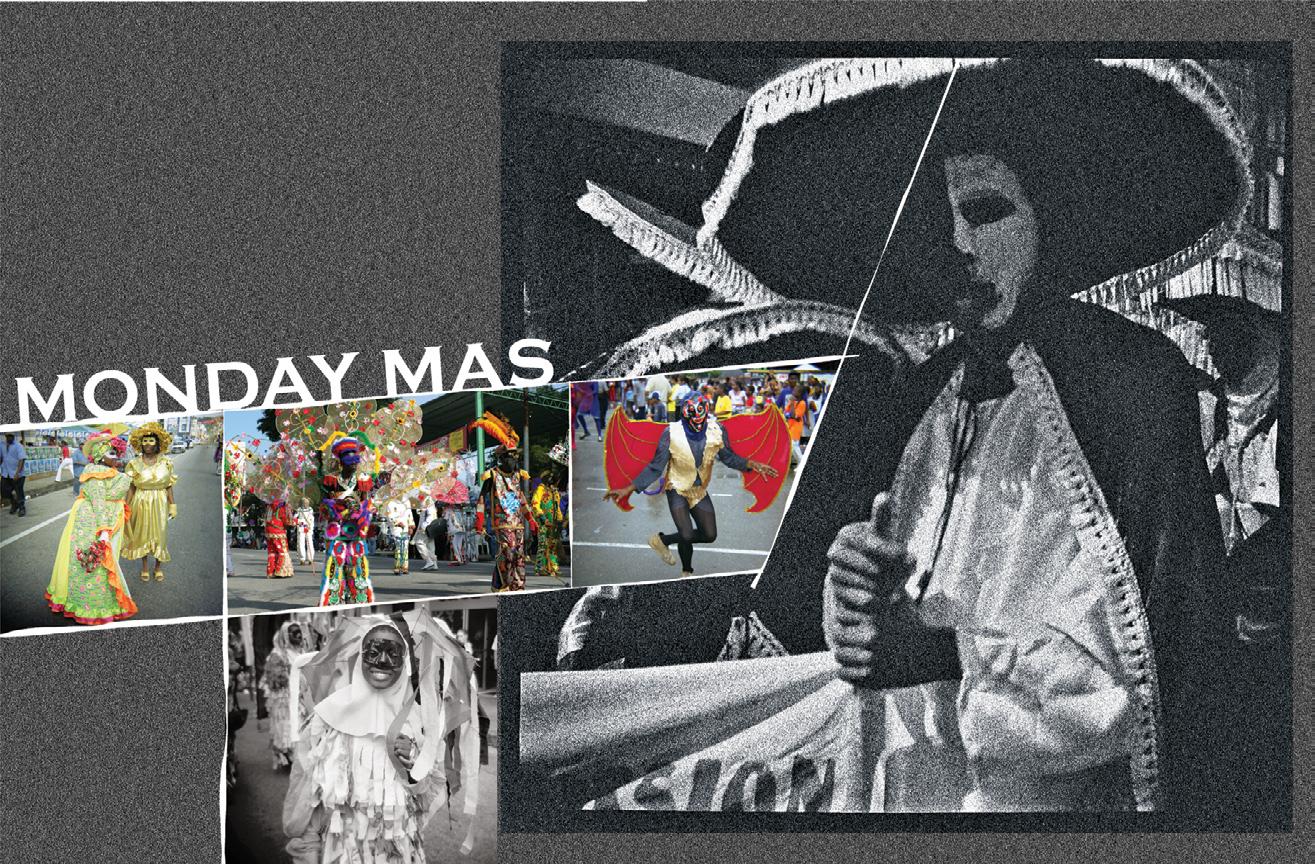

The weekend before the adults play their mas on Carnival Monday and Tuesday, the nation’s children take over the streets of Port of Spain and turn it into a k aleidoscope of colour.

Two ma jor Kiddies
events bring out the creativity of designers like Rosalind Gabriel whose costumes are pictured on these pages.
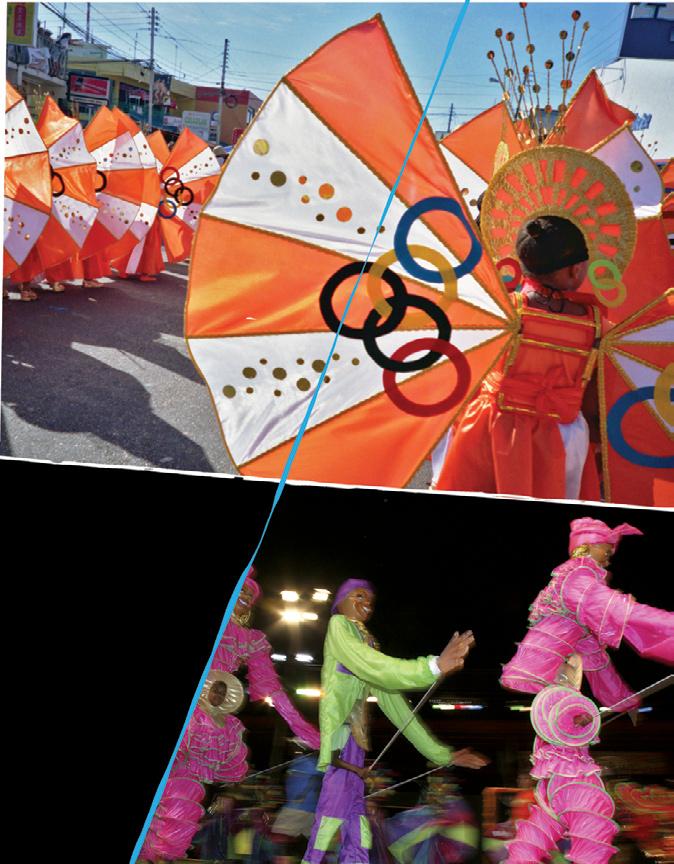
Iwish I could see things through your eyes, hear things through your ears. Fresh. A foreigner. Not knowing exactly what to expect.
I wish I could step out of this pot, wash off the stew, then turn around and enjoy an innocent view of the Trinidad and Tobago musical landscape. One thing is for sure. It would not be boring. Trinidad and Tobago, or “Trinbago” as we like to unofficially call this twin-island state, is a National Geographic wonder, where the official and unofficial exist side by side. Where contrast and contradiction seem to be the order of the day. Any and ever y day. We have an ethnic mix that is both integrated and segregated – Africans, Indians, Chinese, and Caucasians of all flavours, party together... and vote separately. There is wealth and there is poverty. There is order and there is disorder. There is
nauseating heat and freezing air-conditioning. There is the traditional and the ultra-modern. There is just this tension that somehow... works. And nowhere is it more evident than in our cultural expression. What a mess. What a delightful irreverent irresistible provocative exhilarating unpredictable unforgettable mess!
At Carnival time in Trinbago, there are probably many things that it would be impossible to miss. Without question, music would be at the top of that list. You won’t be able to hide from the pulsating, the melodic, the infectious. Sitting in economy class on the flight coming in, you feel it. It’s in the accent and the body language of flight attendants or returning nationals. And there is no need to translate. Your heart beats faster and your pupils widen. Come, let me take you …
The official music of Carnival is Calypso. Well, yes and no (did I mention our contradictions? The Monday and Tuesday before Ash Wednesday are the two official Carnival Days when almost nobody goes to work – but yet they are not official public holidays. Go figure). Calypso is the best-known music of Trinidad and Tobago. But what you might know of Calypso could be anything from Harry Belafonte to those cheesy snatches of the Hollywood Caribbean stereotype. That Calypso doesn’t really exist. The real thing is far more interesting.
Historically, or so it is said, Calypso was derived from songs the 19th century slaves sang to communicate with each other, when other forms of contact was banned. It is also said that the Calypso singer, or Calypsonian, is a descendant of French balladeer s– all very interesting, I’m sure. But, in our lifetime, Calypsoes have been the de facto folk songs of the era, capturing in brilliant detail the issues of the day
For convenience, let’s just say that the term Calypso encompasses all the sung musical material that forms part of the Carnival experience. Its sub-categories include Kaiso, Soca, R agga-Soca, R apso and Chutney Soca. The artform is in transition, as it always has been, but the older practitioners have great difficulty accepting the changes that are taking place. They also seem not to relish passing the baton to newcomers. And therein lies the tension.

Soca is the domain of the young and young-at-heart. At upwards of 140 beats per minute, it is not for the weak, singers and patrons alike. And the new Soca stars have that special charisma. You will quickly come to hear names like Bunji, Machel, Destra, Shurwayne and Maximus thrown around. They will be everywhere. And you will be convinced that, with all the popularity that is evident, all’s well with Calypso. But this is Trinbago. We don’t do “all’s well”.
The Kaiso singers (Kaisonians) of today have been around a long time, most
from the sixties and before. They uncompromisingly embrace Kaiso their own, legitimately inherited from the founding fathers of the 20’s, 30’s and 40’s. Except for the use of modern electronic instruments and an increased presence of the snare drum, it has remained virtually unchanged for over fifty years. It’s tough to give up that heritage without a fight.
But there has been an international phenomenon from which few cultures have escaped. In the late sixties, the Disc Jockey (DJ) was the person who played the records. Simple as that. He eventually realised that, if he played the songs in a particular order, he could control the mood of the party Back then it might have been nothing more than grouping the “slows” together for

Kaiso is the Calypso form that has been around the longest. It is normally slower than the others because the lyrics are its most important facet. Kaiso is used to comment on social issues, ridicule politicians, raise consciousness or provide comedic relief Although it is rhythmic, listening – not dancing –is its participatory intent.
Soca is considered the party alterego of kaiso. Although it can also be used to make social commentary, its purpose is to get you up and on the floor. It is literally impossible to resist. The name Soca came from the two words “soul” and “calypso” and was originally an experimental blend of Calypso and East Indian rhythms. Thirty years down the road since its birth, today ’s Soca bears little resemblance to that formula. Its purpose, however, has not changed. Ragga-Soca is the spicing of Soca with Jamaican Dancehall music.
Rapso is our version of poetry put to rhythm and gets its name from the two words “Rap” and “Calypso”.
Chutney Soca is how the East Indian culture of Trinbago crosses over into the world of Soca. At first it was a way for that community to assert itself in response to a barrage of what was considered predominantly African music and, as such, could have become divisive and discriminatory However, nowadays, Chutney Soca hits are among the biggest of the Carnival. That potential racial tension has produced something unique and unquestionably national
from page 17

ultimately digital recording. For the DJ, anything was possible! In fact, it became in their interest to dictate the tempos and styles of songs being produced so that they could, in turn, “perform” them on their turntables and mixers. They could even produce the material themselves and, through repetitive play, create a taste in the public where none might otherwise have existed. The delivery system had hijacked the message.
Thus there arrived an abundance of DJflavoured recordings which, by and large, bore little relation to what artistes wanted to produce or people wanted to hear Invariably, the material was simpler, less musically complex and with more talking/shouting than singing. Communication between artiste and audience had become dependant on the DJ as middleman and had paid the price. It was time to adapt or drop out.
A possible antidote might have been to have a more direct relationship between
Winston Scarborough, better known as The Original de Fosto
Himself, deliberately creates his calypsoes to favour the steelbands.
the singers and their listeners, through live performances. But it’s so much easier, and cheaper, to put on a record or CD, than to hire a band and the required sound system. Still, live shows are many at Carnival time and this may be why the DJ phenomenon has not completely broken the back of the industry Kaisonians get to perform in the Calypso Tents and shows and Soca artistes have the fetes. On top of that, there are big national Carnival c ompetitions for just about every version of Calypso (e.g. Calypso Monarch, Soca Monarch, R agga-Soca Monarch, Pan Kaiso Monarch, Road March Monarch, Chutney Monarch, R apso, Extempo and so on). This continues to provide the fuel for exciting compositions and performances.
In the past, Carnival was the only time Calypso enjoyed radio airplay and commercial regard but, fortunately, that has changed. The latest trend is that the new radio and television stations are boasting that they only play “we culture”.

This may be a curiously unforeseen backlash of the dreaded cultural invasion that we had feared with the coming of Satellite and Cable TV and the Internet. It could be that, after viewing everything the rest of the world had to offer, we have become tired of it – the novelty and mystery have gone – and now thirst for our own anew Only time will tell if this too is a passing phase.
So, you see, Kaisonians and DJs are not exactly bosom-buddies. Soca better fits what DJs need. And DJs can be very influential in making a new song a hit. And that is the bottom line. With a hit, an artiste becomes a marketable commodity, not just locally, but internationally, wherever there is a West Indian community and the semblance of a Trinbago -style Carnival (e.g. Jamaica, St. Vincent, Grenada, Barbados, Antigua, Toronto, London, Atlanta, Washington, Orlando, New York, Miami... there may be as many as 20 to 30 mini- Carnivals worldwide, which can be exploited if one knows how).
when for the creation and establishment of a hit and the successful singer can tour all year, earning very good money

The tension between Kaisonians and Soca singers is real. Even if it is real only because it is perceived to be real. Every year we hear the old-timers complain that the new stuff lacks the wit, melody and craftsmanship so well established by the traditional. They say it’s too fast, too inane, too crude, too uninspired. In return, the young stars say that they are doing what the people want. Of course, money is money and, as such, there are Kaisonians who put out Soca to try to share in the bounty Imagine, at Carnival time, a singer with a hit can command as much as TT$3,000 for a single appearance and, with bookings for 4 or 5 fetes for any one night, can go home with an average of TT$10,000! And add touring to that! That’s enough to break with tradition.
Live appearances are what bring in the dollars, at home or abroad. In Trinbago,
advertise himself, not as a means to earn money through sales. This is in sharp contrast to what occurs in the big countries where tours promote CD sales and are often sponsored. For us, CDs promote tours. But with all the amazing potential of our music, there is no structured marketing and merchandising. There are still artistes who go door-to -door and sell their wares, one-by- one. Meanwhile, hungry Calypso lovers overseas have difficulty finding their works in the record stores. It is an irony which many have tried to and few have succeeded in avoiding.
But what does the future hold? There are as many opinions as there are persons who will give you an answer Brian London is a 27-year old Kaisonian He grew up in Kaiso. He loves it and refuses to see it die and, in so doing, has managed to carve a pretty lucrative niche for himself (he has won many prestigious competitions a nd even placed second in 2004 in the competition- of-competitions, the Calypso Monarch). But Brian has gotten the unshakeable impression that, instead of the old bards advising and guiding him to take over when they leave, they make it as difficult as possible. They tell him he still has to “pay his dues”. With this sort of oppression and frustration, Kaiso runs the risk of fading into history when its generation is gone (Brian estimates that there are as few as 10 young Kaiso hopefuls who might still continue to run the course). But I know that Kaiso is very much alive in school and amateur competitions, where one can truly see promising talent. It may not be dying just yet.
Alvin Daniel, a Calypso connoisseur, host of popular Calypso television shows and music producer/composer, feels that there is room for all ingredients in this stew Although they might appear to be in competition with each other, the organic whole is alive and well. He says, “ There are several directions in which the Trinbago artiste can go. He or she has to make a choice. If they want to be a poet and die poor, there is a lot of room for that. If they want to sing what some might consider
continued on page 20
to be crap and make money, there is also a lot of room for that. Or, if they walk the middle of the road and give the public what they are already programmed to readily consume, while retaining originality and standards, they can survive, albeit with only a hit- or-miss certainty ”.
Then there those who say to let Nature take its course. “If K aiso has to die, let it die. Archive it if you must but don’t fight change”. There has always been change, they say, and there always will be. “For example, there was a time when singing Kaiso was regarded as the recourse of the underprivileged, as was playing steelpan. Also, Chutney has changed the ethnic tone of Calpyso and a Soca hit (Kevin Lyttle’s “Turn Me On”) has gone to the top of the charts worldwide. These are all things we thought we’d never see. So just go with the flow!”
Personally, I see our melting pot as more like a petri dish, that little controlled environment where the scientist can grow his cultures. When it’s ready, he skims it off and makes it available to the world. Penicillin is no more a wonder than our Calypso. It may seem like a mess while it’s in the dish but what it produces is for your benefit.
You have come at a good time. Enjoy the stew I wish I could see through your eyes and hear through your ears.
For that I am jealous.
Roger Israel is a theatrical composer, studio operator, musician, arranger and producer.
By the way, if you have difficulty finding recordings of any music that you fall in love with in Trinbago, check Alvin atMajor & Minor Productions Limited (www.majorandminor.com)
Mobile: (868) 680-1718, Tel: (868) 628-5722, Fax: (868) 632-5775
E-mail: daniell@wow.net
Interesting Calypso information is available on-line: www.tuco.co.tt
January 27th – Kaiso House Premiere Opening, Skinner Park, San Fernando
January 28th – Kaiso House Media Laucnhing/ Opening, Strand Cinema, Port of Spain
– Power House and Eastern Stars Calypso Tents Grand Opening Two way Clash–Tobago Zone – Junior Calypso Monarch Preliminaries-East Zone
January 29th – Junior Calypso Monarch Preliminaries-South
– Stars of Tomorrow Calypso Finals, Strand Cinema, Port of Spain
January 30th – Junior Calypso Monarch Preliminaries-Tobago Zone
February 2nd – Klassic Russo – Grand Opening-North Zone
– Pioneers 5-9 Calypso Finals, Queen’s Park Savannah
February 3rd – Kaiso Showkase Grand Opening-South Central Zone
February 4th – Junior Calypso Monarch Preliminaries-North
February 5th – Junior Calypso Monarch Preliminaries-North
February 6th – Queen’s Calypso Finals, St. John’s Headquarters,Woodbrook
February 9th – Rapso Explosion
– NWAC Junior 10-12 Calypso Finals, Mannie Ramjohn Stadium, Marabella
February 11th – Junior Calypso Monarch Semi-Finals
February 13th – Young Kings Finals, Pier 1, Chaguaramas
February 15th – Extempo & Limbo Preliminaries
February 16th – Jewels 12-15 Calypso Finals, Queen’s Park Savannah
February 18th – Calypso Fiesta Calypso Monarch Semi-Finals, Skinner Park, San Fernando
February 20th – Junior Calypso Monarch Finals
February 21st –Veterans Calypso Finals, St. John’s Headquarters,Woodbrook
February 22nd – South / Central Zone Calypso Monarch Finals
February 23rd – Extempo & Categories Finals & Limbo Championship
– Pathfinders 15-20 Calypso Finals, Larry Gomes Stadium, Arima
February 24th – International Soca Monarch Finals
February 26th – Dimanche Gras Calypso Monarch Finals
February 27th – Carnival Monday
February 28th – Carnival Tuesday
March 11th – Kings Go Forth, SWWTU Building, Wrightson Road, Port of Spain














Affectionately known as “De Black Spaniard”, “De Fireman” after his most recent fire inspired performance, and most commonly “… De girls dem darlin’” Bunji has taken the Soca game by storm Known for his lightning fast lyrics, a Bunji performance always brings the house down.
Maximus the gladiator… hotter than a r adiator… representing Jah the creator.” The battle cry of the one and only Maximus Dan. This is a remark able entertainer who’s signature is his conscious lyrics. Always a positive message in his music, he gets the crowd jumping for righteousness everytime.

One of the premiere Soca entertainers of this er a is Destr a Garcia. An attr active, entertaining performer who embodies the energy of Soca music in her delivery. She’s adventurous in her music, dr awing on various influences that make her music just right to really break away in the party.

The reigning Road March King Shurwayne Winchester is always a crowd pleaser. His Road March hit “Look De Band Comin’” in 2004 made way for the 2005 smash “Dead or Alive” which took the title for a second time in a row. We all can’t wait for what he has in store this Carnival.

When you say Soca, you have to say Machel Montano… the unofficial Prince of Soca. He’s been doing it since 1983 when he was “Too Young To Soca”, and to this day he still sends crowds into a frenzy with an always energetic, commanding performance.

Call him The Birdie, Dr. Slinger
Fr ancisco or The Mighty Sparrow. Whichever one you use, you will be referring to the unrivaled Calypso King of the World. He has been pleasing audiences for over 40 years with his always entertaining performances and witty calypso songs that r ange in topics from social commentary to relationships.

With seven Calypso crowns under his belt, Chalkdust (ex-schoolteacher) is as good as it gets when it comes to Calypso. A ‘must hear’ for Carnival, Chalkie, as he’s also known, has an arsenal of sweet Calypso music with amusing and amazing lyrics that all can enjoy.

To the wor ld, the Caribbean is seen as the ultimate re laxation zone. From the “Yeah mon, ever yt ing ire!” attitude of Jamaica, to Tr inidad and Tobago where the par ty ne ver ends. For the most par t, this perception is true. In Tr inidad and Tobago, we really do party.We really do relax. After all, we have the biggest Carnival in the wor ld. A two-day long event w ith an informal national holiday (Ash We dnesday) rig ht after.May be that’s why it may be easy for foreig ners and locals alike, to take advantage of the laws that protect the intellectual proper ty of our enter tainers
Piracy is as common in this region as the island sun, mainly because the average person doesn’t know or consider the serious impact it has on the music industry, and by extension, national events like Carnival that rely heavily on the local music.
Besides the activity that Captain Jack Sparrow engages in on a daily basis, Piracy as we all know refers to the unlawful reproduction and/or distribution of both live and recorded material protected by the copyright laws of the land. It may sound as though it’s an act that can only be achieved by planned operations set up to make a profit, but the truth is, individuals are quite capable of doing the damage themselves. It’s as simple as duplicating a CD, and with all the technological advances of the day, we know how easy that can be. Without taking into consideration the fact that their sixty something dollar ticket only entitled them to one night of music, a tourist may easily record a night at one of the many calypso tents “just for the travel journal.”
Or, as so many Carnival lovers do, one may compile a play list of one’s favourite
Soca tracks so one c an r eplay th e memories of the festival until new memories are made. As innocent as these thoughts are, they involve the reproduction of protected material… Bootlegging. An act just as illegal as the old practice of smuggling liquor in boots from which the term itself was derived.
The reality is the music circuit in Trinidad and Tobago is close to non-existent, which translates to fewer opportunities for moneymaking gigs. Carnival provides the most lucrative opportunity for Soca singers, who must go to super human extremes to capitalize on the season. They perform at as many as seven shows a day for the entire season. That’s a lot of long nights. Their album sales, which should really complement their annual income, suffer at the hands of Pirates who sell their music for much less than the originals, cutting the entertainer out of the equation. Thus begins the vicious cycle. The entertainer ’s focus is now shifted to making seasonal music that will get them into a calypso tent, or land them gigs in the big fetes, with hardly any vision for the international m arket. M any compositions are intended for the sole purpose of sending
a crowd of partying Trinbagonians into a jumping, waving frenzy, or making the people raise dust on Carnival Monday and Tuesday. Many of these selections die after the season, mainly because they were not designed to have long shelf lives. It’s all in the name of making a quick buck to survive, or in this case, making back the quick buck stolen from them by Piracy
Maybe an idea of what an entertainer really stands to lose due to the pirating of his or her product may help to highlight how deadly piracy can be. According to one of the island’s most energetic and entertaining DJs/Soca Artiste Dawg-E Slaughter, “…the average cost of producing an album in Trinidad and Tobago is anywhere in the vicinity of $54,000.” This is inclusive of studio time and production costs such as mixing and mastering as well as packaging and other presentation costs. Then, on th e distribution end, there’s still a sales and marketing team or manager that would work for a percentage of the sales, not to mention an additional $5,000 for every reprint run which yields approximately 5000 to 7000 copies. At

Many Trinbagonians will tell you there is something about going down the road behind a steelband that is like no other experience in the world. Whether it is chipping in the cool dawn hours of J’ouvert morning, dancing in the streets under the midday sun or swaying at a slower pace as the sun goes down at ‘las lap’, you will be intoxicated by the infectious rhythm of the pan.
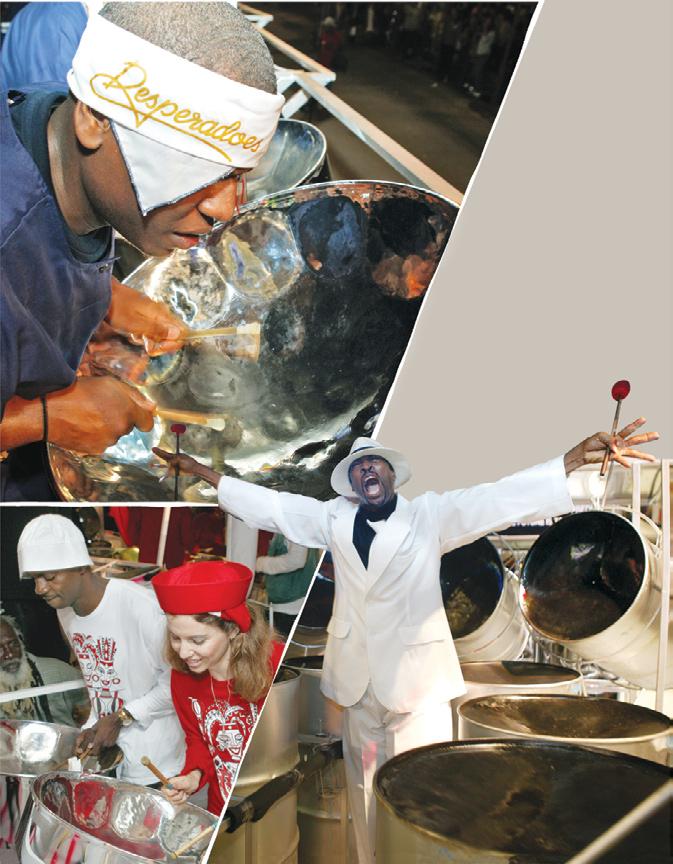
Amazement is the first reaction by firsttimers when they experience the music of a steel orchestra in full flight. And it truly is an experience, even for us who live in the home of the steelpan! That such sweet melody comes from a simple ‘pan’ is only part of the enigma. Visitors are also spellbound by the passion of the players, the way they ‘ramajay ’ (show off their skills) in obvious enjoyment of the music, the instrument’s rich tonal quality and the creativity of the musical arrangements.
Many Trinbagonians will tell you there is something about going down the road behind a steelband that is like no other experience in the world. Whether it is chipping in the cool dawn hours of J’ouvert morning, dancing in the streets under the midday sun or swaying at a slower pace as the sun goes down at ‘las lap’, you will be intoxicated by the infectious rhythm of the pan. It is akin to our cascadura - once tasted, you cannot forget its flavour
Steelpan music is an integral part of Trinidad and Tobago’s spectacular Carnival and an artistic expression that musicians and artisans lovingly create. Panyards are alive as players practise popular calypsoes (songs) or special compositions created by well-known local composers, in preparation for the national Panorama competition. In fact, visiting panyards is an established activity among locals, to support their band as they get ready for the competition or just to come together socially Visitors are always welcome and no Carnival itinerary is complete without a tour of the panyards. Of course, each steelband has its own following – die-hard supporters who are as passionate about the music as they are about the band and who will vow, regardless of the opinion of the judges, that their band is the best!
The Panorama competition brings out the best in pan tuners, arrangers, composers and players. Months of preparation and practice have one aim: to shine on the big Queen’s Park Savannah stage. A gruelling series of rounds determine the best performers. From the preliminary judging in the panyards to the semi-finals and then the much-anticipated finals, bands all over the country work overtime to captivate audiences with their musical mastery The Panorama competition has undergone many transitions over the years but judging is done now in three categories – small, medium and large bands, the latter having hundreds of players. Small or large, the energy and enthusiasm of performers are comparable.
The finals are staged on Carnival Saturday, beginning in the afternoon and ending in the early hours of the next morning. It’s a celebratory mood from start to finish (and even afterwards), for being in the finals is testimony that the band has performed with distinction. The eventual Panorama champion will be the toast of the cultural crowd for the next year but each finalist band will enjoy its own reign.
‘Finals’ night is an adrenaline rush, for players as well as spectators. It is here that the instrument is at its best. It is h ere, on this n ight, that so m any orchestras have played their way into fame, joining the league of champions since the competition was initiated in 1963. Today, Renegades, Desperadoes, All Stars, Exodus, Phase II Pan Groove, Invaders, Silver Stars, Starlift, Angel Harps, Skiffle Bunch and so many more are household names, arousing pride in every music-loving Trinbagonian. 2005 winner (Large Bands) Phase II Pa n Groove, led by Len “Boogsie” Sharpe and playing his composition ‘Trini Gone Wild’ will be remembered for an amazing performance that rocked the Savannah. The crowd really went wild
as judges gave them an unprecedented 20 points ahead of runners-up and defending champion Exodus w hose performance of De Fosto’s ‘From Beyond’ also earned them the ‘People’s Choice’ prize. In the Medium Band category, Sforzata’s performance of ‘Dingolay ’ clinched the top place over Silver Stars rendition of ‘Frenzy ’ which also created quite a stir but it was Buccooneers of Tobago who got the nod as the ‘People’s Choice’.
At the ‘Big Yard’ (as the Queen’s Park Savannah venue is fondly referred to), you have an important choice to make –where to sit, or more likely stand, as the temptation to dance will be strong. The Grand Stand attracts those who come to listen to the music and of course, the judges are located on this side of the stage. In contrast, the North Stand opposite is for the movers and shakers (literally!) – the party crowd who hear a different beat and demonstrate a joie de vivre that is enjoyable to watch and therapeutic to experience. And if you prefer a close up look at the instruments and players or even want to help ‘push pan’ as the steelbands queue up, you can meet the bands at the entry point. No matter what vantage point you choose, Panorama ‘ finals’ is a glorious event to be part of Locals and visitors alike share in the energy, melodic sounds and camaraderie, for it does not matter where you are from – only that you enjoy the music and the moment!
While Panorama is the main steelband competition during Carnival, there are other events like the Single Pan (panround-de-neck) competition, Junior Panorama for schools’ steelbands, Bomb competition and of course, Champs in Concert one week after the main Carnival days when winners are showcased. Other events staged during the year include the popular annual Pan R amajay competition in May, th e biannual Schools’ Steelband Music
continued on pag 32
Festival in October/November, Pan in the 21st Century, Pan Jazz Festival and the World Steelband Music Festival in which steel orchestras from various countries compete.
The steelpan has grown from humble beginnings to world acclaim as the only musical instrument created in the 20th century. Its versatility is well respected and steelpan music has been blended with other instruments like the tabla (drums), piano, sitar and saxophone. The same players who have you dancing with carefree abandon can soothe your senses with classical notes, comfortable with Bach and Beethoven as they are with Jit Samaroo and Len “Boogsie” Sharpe. Scintillating performances on the world stage have thrilled audiences and won over critics from USA to London and Ireland to India. Perhaps the most i mportan t performance of the steelband lies in its ability to unite people across ethnicities, genders and certainly across age groups.
The evolution of ‘pan’ is as interesting as
revelry, using different lengths of bamboo to simulate the main voices of music – soprano, alto, tenor and bass, giving birth to the ‘tamboo -bamboo’ era. The transition to metal in the mid 1930s saw biscuit tins and other metal containers become musical instruments, and later discarded oil drums from the country ’s flourishing oil industry were transformed.
The move to steel was innovative and today the steelpan, the national instrument of Trinidad and Tobago, is as unique as the people who created it. The spontaneous abandon with which pan men and women play, particularly at Carnival, has its roots in suppressed energy and an appreciation of the instrument’s history will also explain the celebratory note of our indigenous music.
As the evolution continues, the steelband movement faces several challenges. Increasing music literacy among the country ’s multitude of players, the majority of whom learn

music in foreign schools and universities as well as orchestras in faraway places like Finland and Japan surpass local counterparts in music literacy Several programs are addressing this gap, including the independently-run Music Literacy Trust, which was conceptualised by local ammonia producer Yara Trinidad Ltd. and set up in 2004 with initial funding from seven energy industry companies. The Trust awards scholarships annually to promising pannists for study at The University of the West Indies’ Centre for Creative and Festival Arts, in both the Degree and Certificate Music programs. Additionally, it financially supports music literacy foundation programs, particularly among young children, as a first step in building a cadre of music-literate citizens.
The learning process of imitation and memorisation that our pannists have been using for decades may arguably be unsurpassed by other musicians in the world; that capability is also admired by many At the same time, a thorough understanding of music and the ability to
February 3rd National Preliminaries (Judging in Panyards)
February 8th In Bands’ respective panyards, 7:00pm North/East/South/Central/Tobago
February 11th National Semi-Final
4:00pm (small conventional Bands) Velodrome, Arima
February 12th Large & Medium Conventional Bands
11:00am Queen’s Park Savannah, Port of Spain
February 18th National Semi-Final (Single Pan Bands)
6:00pm Knox Street, Port of Spain (in front City Hall)
February 19th Junior Panorama Finals
11:00am Queen’s Park Savannah, Port of Spain
February 14th THA Pan Champs
8:00pm Shaw Park, Tobago
February 22nd National Single Pan Bands Finals and 8:00pm National Small Bands Finals Down Town Stands,Port of Spain
February 25th National Finals
7:00pm (Large & Medium Conventional Bands) Queen’s Park Savannah, Port of Spain
February 27th Pan on The Road- Pan/Mas
1:00pm Victoria Square & Down Town, Port of Spain
February 28th Pan on The Road – Pan /Mas
9:00am Victoria Square & Down Town, Port of Spain
February 28th Las’ Lap
6:00pm Western Main Road, St. James
March 4th Champs In Concert–Trinidad

8:00pm Queen’s Park Savannah, Port of Spain
April 15th TSTT Pan In The 21st Century Finals & 7:00pm Down Memory Lane Queen’s Park Savannah, Port of Spain
All Aces, 5 Camile Drive, Boissiere Village #2. (868) 642-8732, 685-1885
Arima Angel Harps, Corner Olton and Eastern Main Road, Arima. (868) 642-8308
Arima All Stars, 4 Malabar Road, Malabar, Arima. (868) 798-4719
Bar 22, Symond Valley Rd, St. Ann's. (868) 625-0244
Brimblers, Alberto Street, Woodbrook. (868) 793-6466
Brazil RX 4, 101R Housing Development, Brazil Village, San Raphael. (868) 643-8234
Belmont Harmonic, 131 Belmont Circular Road, Belmont
BP Renegades, 138 Charlotte Street, Port of Spain. (868) 785-6010
Blue Diamonds, 39-41 George Street, Port of Spain. (868) 680-5287
Birdsong, Corner St. Vincent & Cornell Streets, Tunapuna. (868) 620-5285
Belmont City Kids International, 17 Farrell Lane, Belmont. (868) 624-4321
BWIA Invaders, 147 Tragarete Road, Woodbrook. (868) 633-2397
Chord Masters, Laventille Road, Febeau Village, San Juan. (868) 674-6681
Carib Tokyo, 2A Plaisance Road, East Dr y River, Port od Spain. (868) 623-7758
Carib Pan Jammers, Sam Bocaud Road, Cantaro Village Santa Cruz
Caribbean Paradise, Chinapoo, Mor vant. (868) 624-6817, 755-1146
Casablanca, 31 Belmont Circular Road, Belmont. (868) 628-8980
Carib Dixieland, Mt. Pleasant, Tobago. (868) 774-1255
Crazy Golden Eagles, George Street Community Centre, Port of Spain. (868) 624-0486
Cocorite West Wind, Upper Harding Place, Waterhole, Cocorite. (868) 622-8979
Clico Sfor zata, Cor Evans & Harris Streets, Curepe. (868) 663-1679
Courts Sound Specialists, Eastern Quarr y, Laventille. (868) 627-3175
Couva Joylanders, Railway Road, Couva. (868) 636-0528
Curepe Scher zando, Evans Street, Curepe (868) 640-7870
Crescendoes Musical, 19 Desperlie Crescent, Laventille. (868) 624-1584, 686-8200
Dale White's Family & Friends, Stepan Trace & Subero St, Malabar (868) 778-3664
Deltones, Railway Road, Siparia. (868) 677-3888
D’Untouchables Pan Groove, 205 Pioneer Drive, Sea Lots, Port of Spain. (868) 624-3872
Dem Boys, Mason Hall, Tobago
Excellent Stores Silver Stars, 56 Tragarete Road, Port of Spain. (868) 629-2241
Five Rivers Modem Symphony, The Range, Five Rivers, Arouca. (868) 678-1278
Flamboyant Groove, Bld 16-33 North Maloney Gardens, D'Abadie. (868) 642-6317
Flamingoes, Upper St. John's Road, St. Augustine. (868) 663-0197
Fascinators Symphony, 1 Lammie St., El Dorado, Tunapuna. (868) 663-4642
Fifth Dimention, Serraneau Road, St. Francois Valley Road, Belmont. (868) 621-4753
Free-Lancers Pan Groove, 4-8 Apartment G, Prince/Duncan Street, Port of Spain (868) 625-8796
Flabej Ensemble, Abercromby Street, Port of Spain. (868) 755-8100
Gar y Straker's Steel Orch , Eastern Main Rd, Maturita Village, Arima. (868) 747-0229
Harlem Syncopators, 63 Quarr y Street, East Dr y River, Port of Spain. (868) 623-7471 Har vard Harps, Har vard Club, St. James. (868) 632-8379, 659-5197
HCL Valley Harps, Morne Coco Road, Petit Valley (868) 632-3159
Hilanders, 12 Wharton Street, Success Village, Laventille. (868) 623-9150, 772-1662
Hope Pan Groovers, Hope Village, Tobago (868) 660-2138
Harmonites, Churchill R'velt H'way, Mor vant Junction, Barataria. (868) 773-6309
Humming Birds Pan Groove, 13 Fort George Road, St. James. (868) 777-1851
Hi-Larks, C/O Belle's Cafe, Belmont.
(868) 623-8796, 781-3190
Inncogen Pamberi, Santa Cruz Old Road, San Juan. (868) 622-3117
Ice Water, 1 Bagatelle Road, Diego Martin.
(868) 632-8155

Is We, 31 Nelson Street, Port of Spain.
Jah Roots, Ernest Gardens, Warden Rd, Pt. Ligoure, Pt Fortin. (868) 648-4283
Kalomo Kings, Pleasantville Avenue, San Fernando. (868) 657-9855
Kool & The Gang, Benares Street, St. James. (868) 770-8443
Laventille Pan Strummers, 45A Laventille Road, East Dr y River (868) 624-8323
Laventille Serenaders, Corner St. Barbs & Laventille Road. (868) 625-1608
La Romain Super Vibes, Southern Main Road, La Romain. (868) 653-9541
La Creole Pan Groove, La Puerta Avenue, Diego Martin. (868) 776-9311
Laventille Pashphonics, Upper Pashley Street, Laventille. (868) 627-9242, 743-3913
La Horquetta Pan Groove, Jules Bernard, Crescent, Phase 5, La Horquetta. (868) 643-0683, 763-5187
Longdenville Claytones, Depot Road Junction, Longdenville. (868) 671-3148
Maraval Blanca 47, Morne Coco Road, Maraval. (868) 629-3191
Music Makers, 19 Straker Village, Picton Road, Laventille. (868) 749-0171
Martineau's Natural Mystic, Patience Hill, Tobago. (868) 639-4414
Magic Stars, Jai Ramkissoon Lands, Brazil Village. (868) 643-8171
Marsicans, Mausica Street, Arima. (868) 667-3137, 795-2910
Merr ytones, 1 Bagatelle Road, Greenhill Vlg. Diego Martin. (868) 632-4439
Mor vant Ebonites, Dos Santos Street, Mor vant. (868) 756-4515
Mercenaries, Palm Tree Junction, Toco Main Rd, Toco
Magic Notes Rebirth, Pole 264 Talparo Main Road, Brazil. (868) 643-8171
Moods, Sedennah Terrace, Southern Main Road, Curepe. (868) 645-6461
Mt. Moriah Pan Movement, Wharton Street, Vistabella. (868) 657-8471
Motown, Jadoo Trace, Via Navet Road. (868) 653-1705
Melodians, Cocorite Road, Bellamy Street, Arima. (868) 667-3788
N.L.C.B. Fonclaire, Dottin Street, San Fernando.
(868) 788-1826
New World Symphony, 55 Kassle Street, El Dorado. (868) 645-5156
Neal & Massy T’dad All Stars, 46 Duke Street, Port of Spain. (868) 632-8187
Nu Tones, 6 Cor yat Lane, Arima.
(868) 754-8281, 646-1044
Nostrand Symphony, St. Paul Street, Port of Spain.
New Age Trendsetters, Francois Street, Enterprise, Chaguanas.
Nuttin Big Pan Groove, Upper Morne Coco Rd, Petit Valley (868) 637-8754, 761-6937
Our Boys, Kirk & Fort Streets, Scarborough, Tobago. (868) 639-2250
Panatics, Water Wheel Compound, River Estate, Diego Martin. (868) 632-4821
Petrotrin Phase 11 Pan Groove, Hamilton Street, Woodbrook. (868) 627-0909
Petrotrin Hatters, 100 Lady Hailes Avenue, San Fernando. (868) 652-2341
P.C.S. Starlift, 187C Tragarete Road, Woodbrook. (868) 622-9308
Pandemonium, 3 Norfolk Street, Belmont. (868) 795-8476
Pamberi, Santa Cruz Old Road, San Juan. 642-4097, 663-1314
Pan Pipers, Eastern Main Road, St. Augustine
Potential Symphony, Upper Sixth Ave, Malick, Barataria. (868) 674-1980
Pan On The Move, Sorzano Street, Arima. (868) 667-3397
Panasonic Connection, Macoon Street, Victoria Village, San Fernando. (868) 671-5264
Parr y's Pan School, 165 Eastern Main Road, Tacarigua. (868) 640-4822
Pan Stereonetts, Cumana Village, Toco. (868) 670-8217
Peakes Yacht Scrunters Pan Groove, 13 Jeffers Street, St. James. (868) 622-9550
Pan Fanatics, Bacolet Street, Scarborough, Tobago. (868) 639-4772
Pan Vibe, St. Francois Valley Road, Belmont. (868) 623-2144
RBTT Redemption Sound Setters, Montgomer y Road, Bethel. (868) 639-8219
Rhythm Rockers, Sanchez Street Ext., Arima. Rhapsody Rebirth, LP# 53 Evelyn Ave, Tumpuna Road, Arima. (868) 643-5821
Rio Claro Koskeros, Railway Road, Rio Claro. (868) 644-1149
Scorpion Pan Reflections, Haigh Street, Carenage. (868) 632-1703, 658-9376
Spellbound, Western Main Road, Carenage. (868) 633-3404
Spree Simon Harmonics, Cor Picton & Eastern Main Road, Laventille. (868) 774-4861
Super Sonics, Cor St. Francois & Serraneau Roads, Belmont. (868) 624-2575
St. James Tripolians, Fort George Road, St. James. (868) 683-8508
Southern Marines Steelband, Southern Main Road, Marabella. (868) 658-2564
Shades In Steel, Pointe-a-Pierre Road, Vistabella. (868) 658-0554
Self Help Marines, Egypt Village, Point Fortin.
(868) 648-5564
Siparia Pan Patriots, Alexander Street, Siparia.
(868) 649-1472
Sundowner's, Cor Mt. Moriah & Pointe-a-Pierre Road, San Fernando. (868) 652-4656
San Juan All Stars, 20 Saddle Road, San Juan.
(868) 638-2456

Star Sapphire, Temple Street, Arima.
Sagicor Exodus, Eastern Main Road, St. Augustine. (868) 662-1205
San Juan East Side Symphony, Eastern Main Road, Barataria. (868) 638-5831
Sangre Grande Cordettes, 38 Foster Road, Sangre Grande. (868) 668-4423
Simple Song, 42 Pinto Road, Arima.
(868) 667-5540
Solo Pan Knights, 157 Eastern Main Road, Barataria, (868) 624-9970
Southern All Stars, 8-10 Carib Street, San Fernando. (868) 653-8015
St.James North Stars, 63 Bombay Street, St. James. (868) 622-0364, 794-7021
Starland, Techier Main Rd, Techier Vlg, Point Fortin. (868) 648-4056
Samaroo Jets, Surrey Village, Lopinot Road, Arouca. (868) 642-7024
Surrey Symphony, Pole 22, Lopinot Road, Surrey Village. (868) 642-5800
Tornadoes, 20 Richardson Street, Point Fortin. (868) 648-3734
T&TEC East Side New Dimension, Zion Hill, Belle Gardens. (868) 660-5058
Thunderbirds, Guarata Village, Maracas, St.
Joseph
Trinidad East Side Symphony, Upper Sixth Avenue, Malick, Barataria
Tamana Pioneers, Four Roads, Tamana. (868) 668-3257 / 8226
Trinidad Nostalgic, De Gannes Street, Arima. (868) 667-0182
Trinidad and Tobago Defence Force, Air ways Road, Chaguaramas. (868) 676-0909
Tobago Pan-Thers, Golden Lane, Tobago. (868) 639-3957
Trinidad Pan Connoisseurs, 65 Western Main Road, St. James. (868) 622-0981, 755-1672
Tropical Angel Harps, Southern Main Road, Enterprise, Chaguanas. (868) 665-0315
TCL Group Skiffle Bunch, Coffee Street, San Fernando. (868) 657-8803
T&TEC Power Stars, 114 Western Main Road, St. James. (868) 628-4926
Tunapuna All Stars, Barath Street, Pasea Recreation Grd (P.B.R.). (868) 663-5301
Tobago Buccooneers, Chance Street, Buccoo, Tobago. (868) 639-8519
Uni Stars, Old St. Joseph Road, Laventille. (868) 623-6710
Untouchable Pan Illusion, 2 Panchoo Lane, El Socorro. (868) 672-3110
United Sounds, La Retret Road, Wallerfield. (868) 667-1318
Woodbrook Modernaires, Cor Tragarete Road & French Street, Port of Spain.
Woodbrook Playboyz, 24 Woodford Street, Newtown. (868) 628-0320
West Stars, 17 Parakeet Ave, River Estate, Diego Martin. (868) 759-5186, 637-6952
World Wide, Mt. Hololo Road, St. Anns. (868) 624-4563, 678-3336
West Side Symphony, Riseland Local Road, Patience Hill, Tobago. (868) 639-5186
Witco Desperadoes, Upper Laventille Road, East Dr y River (868) 752-2742
the end of the day, putting out that kind of money and getting back even less than half of it is at the least discouraging. Yet, producing an album is necessary for any artiste to do for all the obvious reasons I mean, what’s an entertainer without an album? But by the same token, what good is spending money on a product that you know is going to leave you in the red.
It goes without saying that a lot of things that ride on the existence of an album tend to suffer in instances such as these. Take music videos for example. In an industry like ours where little or no emphasis is placed on selling albums due to low returns, music videos are few and far in between. With the advent of local television stations such as Gayelle and Synergy, dedicated to showcasing local culture, especially music, a few more videos are being produced. But the amount of videos that exist as opposed to the amount of songs that exist is far out of proportion. Their role in the scheme of things is more about keeping the artiste and their songs in the public’s eye, rather than an expensive ad for an album based on one of the album’s pick hits.
Contrary to a lot of the perceived opinions of the islands and the mentality of their people, when it comes to handling business, some bodies have already begun to devise innovative plans to help reduce the effects of piracy on the industry These projects are quite similar to international trends such as the evolution of Napster, the popular on-line file-sharing software that saw a 1% decrease in music sales in the 2004/2005 period. With a restructure of the facility, music is now being offered at a very nominal fee that can be achieved through the advantages of using the digital media. It excludes the consumer having to pay for packaging, reproduction, shelf space and even from having to buy a collection of songs rather than the consumer ’s song of choice. In
Trinidad and Tobago’s situation, lawyer Anabella Davis has spearheaded a drive to give street vendors who sell pirated CDs, a legal licence to obtain, reproduce and distribute music on behalf of the local entertainers. The system is one that offers returns to the artiste, on music sold and will have an association of vendors who will, from the official launch date, be thereafter referred to as “entrepreneurs”. They will receive a mastered copy of the entertainer ’s music, and they must handle the reproduction, packaging and distribution of it. This takes a big bite out of the artistes’ production budget, and at the same time allows the actual work to be sold at the “pirate price” which is usually
a lot cheaper than store price. Thus far, some artistes have shown interest as well as Liaison Officer Sean Julian of the Ministry of Culture and Gender Affairs. That’s about one of the best examples of how serious the industry is treating this problem.
The point is piracy is harming the industry from many different angles. We should think twice about our “music acquiring” options this Carnival… well at least we hope you will. Get your original albums from legitimate record stores and ensure that you support the local musicians and vocalists who put their all into m aking C arnival the musically stimulating sensation it is.



 Mitchell
Mitchell
Getting that body ready for Carnival is not about walking the Savannah every day for a few punishing weeks or going on a starvation diet starting January second. It’s about committing to a fitness routine that will increase your stamina while toning your muscles and trimming your waistline … it’s all about starting at least three months before the Carnival season!
Remember that fêtes keep you dancing until the wee hours of the morning, and masqueraders following the big truck have been known to cover ten miles and more in a single day. Costumes are very revealing and once you’ve paid your deposit you’re committed to that exact style and size. If you want to make the most of the Carnival season you’re probably among the many who want to lose weight and tone up, but you should also think about increasing your stamina on the road. Simply cutting down on calories isn’t the solution.
There are lots of activities that you can do to burn calories, increase muscle tone, and improve stamina. Cycling, running, swimming are three popular sports that quickly come to mind. However, throwing an aerobics class into the mix is a real winner when it comes to getting Carnivalready An aerobics class not only gives you a great cardio workout (think: burning lots of calories and increasing your endurance), it is excellent for balanced, overall muscletoning. Moreover, many aerobics movements actually mimic all of that jumping up you’ll be doing at fêtes, and in your band come Carnival Monday and Tuesday. Adding aerobics into your fitness routine will help give you staying power until las’ lap.
One of my favourite pre- Carnival aerobics movements is a simple combo routine in which we jump straight up and down for several minutes. We do this in sets and as part of a combination set of movement. In other words, we repeat it several times and it really works you. Don’t believe me? Try it at home and feel your heart pump and your thighs burn.
Of course, any abdominal work is compulsory when you think about clingy fete outfits and skimpy bikini costumes, so imagine the benefit of having a bossy instructor hover while you do your crunches. No wimping out! Another preCarnival favourite of mine is a combo move that involves a variety of dance steps, arm movements, and in-place jogging. It’s fun, it keeps you thinking, you sweat a ton, and although you don’t get very far jogging
in place, that forward propelling motion will have you well-prepared for chipping down the road.
So what’s a good recipe to work with?
Exercise three to five times a week, a minimum of 20 to 30 minutes, with aerobics occupying at least one – but preferably two – of those slots. You can even make aerobics your exclusive exercise by going to classes three to five times a week. I can name several fit, healthy, toned people who follow this exact routine, and they do it year-round. A few measly months will be easy (but of course I recommend a continuous exercise regime). This may sound like a demanding schedule at first blush, but the more you work out, the more fit you’ll be, and the better you’ll look in that costume. An important thing to keep in mind –whether you’re serious about losing weight or simply showing off your newly developed abs – calorie control must be part of your routine. Muscles don’t ripple when they are hidden beneath an extra layer of fat.
The term aerobic means "with oxygen."
Broadly defined, aerobics classes get your heart pumping and well oxygenated and they incorporate a series of disciplines such as flexibility, strength (upper, lower, and core), endurance, balance, and coordination. A class typically lasts about an hour, with the final 15 to 20 minutes often devoted to a floor routine involving abdominal work or using strengthening
tools such as weights. However, class length and routine are both determined by individual aerobics instructors.
Types of aerobics classes run the gamut from Funk Aerobics to Tae Bo ( an aerobics version of kick-boxing) and vary in the kinds of music you’re exercising to as well as the exercise techniques emphasised. There is even a striptease aerobics video sold on the Internet that incorporates some bottom- spanking. Be sure to research what’s available in your area and what body parts each class targets before deciding which one is right for you. Other factors are location and schedule, not to mention which classes your exercise pals are enrolled in. So take your time choosing your class.
No matter what class you choose, even if it’s Punk Rock Aerobics (yes, this really exists) you can’t go wrong by going aerobic. A 130-pound woman can expect to burn 245 calories after a 40-minute session of light aerobics. My calculation is meant to assess only the cardio section of a 60-minute class. It’s also important to note that by increasing the intensity of the workout to medium or heavy, and lengthening the amount of time you spend during the cardio, you will help increase your caloric burn as well as your fitness level. For example, 40 minutes doing moderate aerobics burns about 315 calories while the same duration in a heavy class will reward you with about 350 expended calories. Your weight is also a
determining factor in assessing calories burned. Fo r more information about estimating calories and exercise, you can do a Google Web search on “exercise calories”.
Starting an aerobics routine for the first time can take some getting used to. You’re exercising in a studio and possibly in a class that seems to be packed with professional aerobics buffs who have the steps and instructor ’s instructions down pat. The pace can initially even seem overwhelming. However, the truth is that you can catch on to the moves fast, and you can dial into an intensity level that’s just right for you. I promise if you keep at it, your fitness will increase over time and so will the intensity level that you can handle. That said, it’s best not to frustrate yourself from the beginning by paying too much attention to your classmate’s coordinated outfit or by starting at a level that’s too aggressive, thus burning out after the first class.
There is also the option of working out privately if the group scene is intimidating. You can watch early morning exercise cable shows or rent a DVD to follow in front of the television, on your own schedule. The television option is also handy for folks whose work, school, or parenting routine doesn’t allow for time, or cost, of a gym membership. When you’re ready you can make the move to your local gym.
One positive thing to keep in mind with group classes, and why I prefer working out at a gym vs. at home, is the camaraderie. Working out in a group can help push you in ways that you won’t achieve on your own, and I personally do better when an instructor is breathing down my neck. Also, fellow classmates, who often are, or will become, your friends, help encourage you on days when you’d rather be home eating ice cream and watching MTV.
The good news is aerobics is loads of fun and there is a wide variety of choices when it comes to selecting a class that’s right for you. And yes, aerobics classes are most popular among women but a lot of men enjoy and benefit from this exercise too.
When the Carnival season comes around, there’s one thing you can count on… THERE WILL BE FETES! Party, party and mor e party And did we mention party? The lead up to Carnival Monday is laden with hot Soca fetes that feature all the hottest DJs, playing the biggest Soca tunes, and introducing live performances from the top names in Soca. So being the cool resource that we are, Play Mas ’06 has the low down on some of the major fetes you should be at for Carnival.

FETES in Trinidad and Tobago span the range in terms of size, cost and excitement. If you are adventurous you may venture into Brass Festival which attracts about 30,000 patrons, but for the uninitiated, you may want to stay with the packaged “All-Inclusives” which for the price of US$50-$100 offer an open well stocked bar, entertainment and a variety of foods.
triniscene.com is your website for additional info on fetes during the season.

that every performance goes all with lots of surprises and even more of hi friends from the Soca fraternity

Usual Venue: MOBS 2, Chaguaramas
Date: Saturday before Carnival week
west coast all the way until 11:00 the following morning. In addition to great music from several top Soca acts, you witness a remarkable sunrise over the city of Port of Spain and the Gulf of Paria. At breakfast time, enjoy a real Trini breakfast, which includes items like Bake & Shark, Doubles, Corn Soup and other tasty delicacies. It’s a wonderful way to stay up all night! Note however, get your tickets early–prices go up almost on a weekly basis.
Usual Venue: MOBS 2, Chaguaramas

Date: Carnival Saturday

There is no Carnival without Brass! This event, the largest Soca festival in the world, is the epitome of Carnival. This hyped event features on average 15 Soca bands and 25 of the Caribbean’s top Soca acts. “Brass” as it is popularly known was started in 1989 and has grown into a jamboree of 25,000 screaming and jumping flag bearing fans. A word to the wise: this event is not for the un-initiated. Be prepared to jump and wave and ‘misbehave’ non-stop for hours in frenetic and wild abandon.
Usual Venue: PS A Grounds, Port of Spain

Date: Saturday before Carnival week
All over the Caribbean, and in many parts of the world, the name Machel Montano is synonymous with hyped, entertaining live performances. The Prince of Soca, as he is sometimes called is indeed one of the season’s headliners with a dedicated following
patrons party at one of the most enchanting hillside venues on Trinidad’s
much so that it has been replicated in Carnivals around the world. Ensure that you are cutting in your trendy white outfit so that you can ‘glow ’ under the UV lights put up at this fete. Dance to great music usually featuring band from one of the neighbouring Caribbean islands, alongside some top Trinidad and Tobago acts.



Usual Venue: MOBS 2, Chaguaramas
where, for one price, patrons can eat and drink as much as they can. Although many years later this concept has become extremely popular among other schools and institutions, UWI Fete remains one of the most sought after with tickets selling out even before they hit the streets. Proceeds from this fete go to the UWI Endowment Fund and is used to benefit the students at the University
Usual Venue: Principal’s office grounds
Date: January 22


girls night out, 1000 ladies must enter before the first man can walk into the promised land. Needless to say, it’s ladies galore! And to crown it off, the acts of the night include all the top female Soca stars such as Destra Garcia, Denise Belfon, Michelle Sylvester, and more.
Usual Venue: Queen’s Hall Car Park, St. Ann’s, Port of Spain

To all cricket fans Brian Lara is King. The world record-holding batsman, dubbed as the Prince of Port- of Spain, hosts an All-Inclusive party every Carnival Sunday, laden with great music, excellent food, premium bar, a superb view of Port of Spain and of course a star-studded guest list. This is a great way to get ready for the reign of the Merry Monarch over the two days following.
Usual Venue: Brian Lara’s Residence, St. Clair

Date: Carnival Sunday
University students come out to move to Soca and jump to the performances of every big Soca entertainer and Soca band. There’s no water in this one, but you’re sure to leave wet
The University of the West Indies Guild of Graduates was the first educational institution to come up with the concept of an All-Inclusive party
DO have your tickets or entrance money with you, but ensure that they are safely tucked away DO walk with a waving implement (rag, handkerchief, flag, etc) to have something in hand when the band calls to put your flag in the air DO walk with “vex money ”
extra money – for a taxi to get back home or to your hotel. DO have a cell phone with you at all times, or a local phone card in case of emergency
Wear your hat and win cash for the wildest, craziest cap or headgear!
Usual Venue: MOBS 2, Chaguaramas
Date: Carnival Wednesday
DO carry a condom just in case. DO make firm transportation arrangements prior to going to the fete. triniscene.com

For updates and additional information log on to

More hot chicks from Trinidad have written to me than from anywhere else. Could the next Mrs. Dr Keepfit be waiting for me in that tropical paradise? The more e-mail I received, the more I started to feel like my destiny was to pay Trinidad and my Trini fans a visit. But you know me, a look-before-youleap kinda guy I booted up the computer and checked T&T out on the Internet. The deal was instantly clinched. Trinidad has three major things going for it, and all of them are on my A-list.
1. Beer: They make their own and lots of it. No need to say more, but I will.
2. Exercise: There’s this thin g called Carnival, an all-in- one fitness-fest where women wear nothing but bikinis, sequins, and a few feathers. During Carnival everybody gyrate their bodies non-stop while running through the streets of Port of Spain. No need to say more, but I will.

3. Romance: During Carnival the ratio of girls-to -guys is something like 10-to -1. I’ll stop right there.

“Gyrate” is my middle name, and I deserved a week of fun, so I booked a flight, packed my sunscreen, and of course bought a guidebook. I was so excited I did a triplespin in my office chair Then something happened. The chair stopped spinning at a particular spot, facing a particular wall where a particular piece of paper hung. Shite. My training schedule for a marathon three weeks after my return date. Somehow drinking, gyrating, and romancing were not adding up to that sub-four-hour marathon I had been shooting for
Panic-soaked disappointment shot through my body What to do? I contacted the publishers at Island Sports & Fitness (two of my hottest e-pals, by the way) who gave me that famous island assurance: “No problem,” and promised to hook me up with some serious runners and a costume for Carnival. I breathed a sigh of relief and
threw my bags in the back of a cab. Fun, sun, and fitness would be mine in just a few short hours.
The Trinidad leg of my journey could only be described as an airborne party Drinks flowed, and people packed the aisles as they reunited with friends for a bit of “ole talk.” The plane was delayed by 45 minutes as the pre- Carnival party carried on, and soon-tobe masqueraders ignored commands from the crew to take our seats. There were no old friends for me to reunite with so I found a nice group of youngsters (30-something) who promised to take me to the most “wicked” Carnival fetes. “It’s all about stamina,” advised a seasoned North American lady in the seat next to me, “educating” me on how to handle the Carnival experience. “You just have to pace yourself.” Pace myself?! I’m a marathoner, a stamina master By the time we reached the
airport I had my entire holiday planned out to the nanosecond.
8am – 12pm: Train 12:01pm – 3pm: Eat 3:01pm - 5pm: Shopping/sightseeing
5:01pm 7pm: Eat/bathe/dress
walked into my hotel room. My pals from the plane, ecstatic because they scored tickets to a fete. “But it’s 10 o’clock,” I said, my protest falling on deaf ears. They had already hung up and were on their way to get me. No problem, the party would end by 12am at the latest, and I’d be in time for seven hours of uninterrupted sleep.




Amazingly I finished our 12-mile run in 33degree heat in fairly good form (8.5-minute miles) and returned to my hotel room where I collapsed on the bed. Imagine my surprise when t he telephone starte d ringing. My party friends telling me about tonight’s fete, but with promises to have me home at a reasonable hour. I spent the rest of the day lying in bed watching TV and recuperating. Sightseeing would have to wait for another day
stepped plane tarmac, confident that my Carnival would be a success. I would brains out and still return ready to kick butt in my Marathon.

The Island Sports & Fitness waiting for me when I arrived met them in person. (Let’s was pleasantly surprised.) was the Squeeze pub, their was introduced to a few several local beers. (Stag quickly my beverage of choice.) Then a restaurant named Solimar exceptional dinner Having dined after hours of travel bed, so the ladies dropped me at my hotel and went on their way surprise to hear my telephone ring as I
the party didn’t finish at 12. That’s started. Granted I was overwhelmed by the many romantic possibilities… but my little friends didn’t
The fete on this day was better than the last, probably because I was starting to get I was also Carnival future (I would meet several of them before leaving When’s the my party pals deposited me at my hotel room in the inebriated state. heard as the night. “My to myself hottie I’d surprise to could open call from run. And I hours of pretty good this time) I , I’ve still changing my . Stamina. Of course the rest of and several the night’s fete and my hottie. I would have to modify would have to costume party, me some
old something that seemed to work. It was like a Carnival warm-up with lots of people bad.” I had eepfit, and uesday was hot lava. I couldn’t help noticing my rounded belly as I lay on my back in bed that night. I had I I
continued on page 46
I consumed a lot of eats and drinks that night, and here was the proof. This time for my 5am wakeup call I thankfully wasn’t walking in the door, however I did wake up to find my tongue glued to the sheet. Pouring water on it helped pry it off I was going to have to dig deep if I wanted to make a good showing at this morning’s run.
Success! After partying all night I ran three consecutive miles in 36 minutes. Tw elve-minute m iles. N ot bad, considering “Buddy, you’ve still got it,” I muttered to myself as I rolled into bed and drifted into unconsciousness. Imagine my surprise when the phone rang. You guessed it: my plane pals with that night’s party plans. Sightseeing would have to wait another day
Things deteriorated to the point that I wore my pedometer during Carnival Monday and Tuesday and logged those days as training miles.
I slept all day and flew out the next. the time I returned home I had nothing but a rudimentary level of fitness. I also a bit paunchy and had to shelve marathon plans as well as the guidebook that I never opened. From a holiday point of view? I didn’t find Mrs. Keepfit (No problem: I saw thousands of strong candidates), but I took part the World’s Best Party I paid dearly it was worth it. I’ll be back next time some sightseeing too.
Pat Isman (Dr Keepfit) has physically active for his entire life writes the popular humour/sports colum “Dr. Keepfit.” If you have a comment him he can be reached drkeepfit@hotmail.com.

from page 10
daubed a ll over in molasses, who roamed — or rather jigged and danced and trotted about the streets, accosting spectators. There were usually two of them: one beating a rustic drum or pitchoil tin to make rhythm, and the other leading the way with a little devil’s fork, and a three-word demand: “Pay the devil.”
For many spectators of the Carnival this is one of the most unwelcome of all the masquerade, because they have to pay up, and quickly, or get their clothes soiled with molasses, or sometimes tallow grease or tar One remembers dressedup spectators scurrying to escape the Jab Malassay.” And there is no point in getting vexed and wanting to fight, because the Jab Malassay would be ever so happy to have a free fight with you and have your clean clothes completely ruined.
The Su-Marie, with its Amerindian connections, is Venezuela’s contribution to the Trinidad Carnival. It is also known as “Burrokeet.” This masquerade is usually of three characters—the main one is that of a person riding a donkey (or in Spanish, Burroquite), and the other two are his attendants.

It is a very attractive display to look at. The Burrokeet, a fabricated one, is usually beautifully made, and is part of the costume of the chief character A ring of people is formed around this character, who dances around in circles, while both of his attendants give orders, and try to control the Burrokeet.
The story of the Burrokeet is totally confusing to Trinidadians, because it seems to be a Venezuelan story But the display is very entertaining to watch. Unfortunately, the Su-marie or Burrokeet, a popular masquerade up to when Carnival was banned in 1942 because of the war, never seemed to return after the war was over in 1945. When Carnival resumed in 1946 it

Port of Spain & Environs
Adam’s Bagels & Specialty Breads
(868) 622-2435
International
15A Saddle Road, Maraval
A La Bastille
(868) 622-1789
French
Cor Ariapita Avenue & De Verteuil Street, Woodbrook
Apsara Restaurant
(868) 623-7659
Authentic North Indian
13 Queen’s Park East, Port of Spain
Battimamzelle
(868) 621-0541
Caribbean / International
44 Coblentz Avenue, Cascade
Bois Cano Bistro & Bar
(868) 622-5765
Local / Caribbean
16-18 Cotton Hill, St. Clair
Buccaneer’s Cove Restaurant
(868) 628-5087
Local / International
Royal Palm Hotel
7 Saddle Road, Maraval
Chaconia Hotel – The Rooftop
(868) 628-0941
Caribbean / International
106 Saddle Road, Maraval
China Palace Restaurant
(868) 622-5866
Chinese Ellerslie Plaza, Maraval
Crews Inn Hotel -
Lighthouse Restaurant
(868) 634-4384
Caribbean / International Point Gourde, Chaguaramas
Crowne Plaza -
360 Degrees Restaurant
(868) 625-3366
International Wrightson Road, Port of Spain
Hanami Sushi Bar
(868) 623-5370
Japanese Shop #7 - Movie Towne
Invaders Bay, Port of Spain
Il Colosseo
(868) 628-1494
Italian Fine Dining
16 Rust Street, St. Clair
Jenny’s on the Boulevard
(868) 625-1807
Chinese / Steak / Seafood
6 Cipriani Boulevard, Port of Spain
Joseph’s
(868) 622-5557
Mediterranean
3A Rooker y Nook, Maraval
Kam Wah Restaurant
(868) 628-8888
Cantonese / Szechuan
74-76 Maraval Road, Port of Spain
Las Cuevas Beach Lodge
(868) 669-6945
International / Seafood
North Coast Road, Las Cuevas
Laughing Buddha
(868) 627-0100

Japanese
86 Frederick Street, Port of Spain
Melange Restaurant
(868) 628-8687
International 40 Ariapita Avenue, Woodbrook
Olives Mediterranean Bistro
(868) 622-9688
Mediterranean
22 Sweet Briar Road, St. Clair
Perks
(868) 628-6969
Gourmet Coffee & Dessert House
62a Ariapita Avenue, Woodbrook
Plantation House
(868) 628-5551
Caribbean / Cajun
Cor Ariapita Avenue & Cornelio Street
Woodbrook
Rafters Restaurant
(868) 628-9258
Caribbean / Seafood
6a Warner Street, Newtown
Ruby Tuesday
(868) 624-6566
International / Steakhouse
Movie Towne Boulevard
Invaders Bay, Port of Spain
Sails Restaurant & Pub
(868) 634-4303
West Indian / International
Power Boats Boat Yard, Chaguaramas
Solimar
(868) 624-6267
International Fine Dining
6 Nook Avenue, St. Ann’s
Tamnak Thai Restaurant
(868) 625-0647
Authentic Thai
13 Queen’s Park East, Port of Spain
TGI Friday’s
623-9284
International / Steakhouse
5-5a Queen’s Park West, Port of Spain
The Bight
(868) 634-4839
West Indian / International
Peake Yacht Ser vices
5 Western Main Road, Chaguaramas
The ChancellorWaterfall Bistro & Bar
(868) 623-0883
Caribbean / Latin American
5 St. Ann’s Avenue, St. Ann’s
The Normandie - Café Trinidad
(868) 624-1181
Local / International
10 Nook Avenue, St. Ann’s
The Normandie - Vidalia
(868) 624-1181
International
10 Nook Avenue, St. Ann’s
Tiki Village
(868) 622-5765
Asian / Polynesian
16-18 Cotton Hill, St. Clair
Tony Roma’s
(868) 627-7427
Steakhouse / International
51 Cipriani Boulevard, Port of Spain
Trotters Restaurant & Sports Bar
(868) 627-8768
Caribbean / International
Sweet Briar & Maraval Roads
Port of Spain
Veni Mange Restaurant
(868) 624-4597
Caribbean / International
67a Ariapita Avenue, Woodbrook
The Verandah
(868) 622-6287
Caribbean
10 Rust Street, St. Clair
Bootleggers Restaurant & Sports Bar
(868) 640-1179
International / Steak
Trincity Mall, Trincity
Botticelli’s
(868) 663-8733
Italian / International City of Grand Bazaar
Churchill Roosevelt Highway, Valsayn
Fai’s Chinese Restaurant
(868) 645-6868
Chinese 94 Eastern Main Road, Tunapuna
Rasam
(868) 645-0994
Southern Indian City of Grand Bazaar
Churchill Roosevelt Highway, Valsayn
Salybia Nature Resort –The Paradise
(868) 668-5959
Caribbean / International
13 mile post, Toco Main Road
Salybia Village, Matura
The Chinese Wok (868) 640-3542
Chinese Level 2, Trincity Mall, Trincity
Valpark Chinese Restaurant
(868) 662-4540
Cantonese
Valpark Shopping Plaza
Morequito Avenue, Valsayn
Woodford Café
(868) 622-2233
Local 62 Tragarete Road, Newtown
Balthazzar Restaurant & Bar
(868) 636-1294
Local / Chinese
Edgar Street & Southern Main Road
Couva
Bougainvillea Restaurant
(868) 636-4837
Local / Chinese
85 Rivulet Road, Point Lisas
Buffet King Restaurant (868) 671-8795
Chinese / International Center Pointe Mall
Ramsaran Street, Chaguanas
Kampo Restaurant (868) 665-4558
Chinese
53 Ramsaran Street, Chaguanas
Lynx Restaurant (868) 672-8465
International
52 Mulchan Seuchan Road, Chaguanas
TGI Friday’s (868) 671-3844

International Price Plaza, Chaguanas
The Chinese Wok (868) 665-6637
Chinese
Mid Centre Mall, Chaguanas
In South
Canton Palace
(868) 652-5993
Chinese
Cross Crossing Shopping Centre
San Fernando
Cara Suites – The Metropolitan (868) 659-2271
West Indian / International Southern Main Road, Pointe-a-Pierre
Jenny’s Wok & Steak House (868) 652-1807
Chinese / International
175 Cipero Street
Victoria Village, San Fernando
Royal Hotel (868) 652-4881
International
46-54 Royal Road, San Fernando
Schelles (868) 697-2742
International / Seafood
Paria Suites
South Trunk Road, La Romain
Soong’s Great Wall Restaurant (868) 652-2583
Chinese
97 Circular Road, San Fernando
TGI Friday’s (868) 653-8443
International Gulf City Mall
South Trunk Road, La Romain
Tree House Restaurant (868) 653-8733
Local / International
St. Joseph Village, San Fernando
Restaurants – Tobago
Buccaneers Beach Bar & Grill
(868) 639-0191
Local / International / Seafood
Stonehaven Bay, Black Rock
Café Coco
(868) 639-0996
Caribbean / Seafood
First left off Pigeon Point Road
Crown Point
Café Melange (868) 631-0121
Mediterranean fused with French
Caribbean
133 Shir van Road, Mt. Pleasant
Caribbean Chulha
(868) 631-0121

Indian / Cajun / Caribbean
133 Shir van Road, Mt. Pleasant
Kariwak Village Restaurant (868) 639-8442
Caribbean / International
Store Bay Local Road, Crown Point
La Terrazza (868) 639-8242
Italian
196 Shir van Road, Mt. Pleasant
MeShell’s
(868) 631-0353
International with Caribbean flavour
Cor Shir van & Old Buccoo Roads
Pelican Reef Bar & Grill
660-8000
Seafood / Steak
Milford Road, Crown Point
Shir van Watermill
(868) 639-0000
Creole / International
Shir van Road, Mt. Pleasant
The Arnos Vale Water wheel (868) 660-0815
‘New World Creole’
The Arnos Vale Estate, Arnos Vale
The Pavilion (868) 639-0361
International Stonehaven Villas
Stonehaven Bay, Black Rock
The Seahorse Inn Restaurant & Bar (868) 639-0686
Creole / International / Seafood / Steak
Grafton Beach Road, Black Rock
Toucan Inn – Bonkers Restaurant (868) 639-7173
International Store Bay Local Road
Crown Point
Hotels
Abercromby Inn
101 Abercromby Street, Port of Spain
Tel: (868) 627-6658, 623-5259
Email: aberinn@fiberline.tt
33 Rooms
Alicia’s House
7 Coblentz Gardens
St. Ann’s, Port of Spain
Tel: (868) 623-2802
Fax: (868) 623-8560
Email: aliciashouse@tstt.net.tt
Website: aliciashousetrinidad.com
19 rooms
Ambassador Hotel 99A Long Circular Road, St. James
Tel: (868) 628-9000
Fax: (868) 628-7411
Email: ambassador@wow.net
Website: www.ambassadortt.com
54 Rooms
The Cascadia Hotel and Conference Centre
67 Ariapita Road
St. Ann’s, Port of Spain
Tel: (868) 623-4209, 623-3511, 623-3513, 623-3515
Email: info@cascadiahotel.com
Website: www.cascadiahotel.com
68 rooms
The Chaconia Inn
106 Saddle Road, Maraval
Tel: (868) 628-0941, 622-2346
Email: bookme@chaconiahotel.com
Website: www.chaconiahotel.com
The Chancellor Hotel and Conference Center
5 St. Ann’s Avenue, Port of Spain
Tel: (868) 623-0883
Fax: (868) 623-0883
Email: info@thechancellorhotel.com
Website: www.thechancellor.com
30 Rooms
Coral Cove Marina Hotel Limited
Western Main Road, Chaguaramas
Tel: (868) 634-2040, 634-2244-7, 634-2248
Email: coralcove@trinidad.net
Website: www.coralcovemarina.com
14 rooms
Crews Inn Hotel and Yachting Centre
Point Gourde, Chaguaramas
Tel: (868) 634-4384 or 4385
Fax: (868) 634-4542
Email: crewsinn@tstt.net.tt
Website: www.crewsinn.com
46 rooms
Crowne Plaza Trinidad
Wrightson Road, Port of Spain
Tel: (868) 625-3366
Fax: (868) 625-4677/2773
Email: sales@crowneplaza.co.tt
Email: eoffice@crowneplaza.co.tt
Website: www.crowneplaza.com
244 rooms
Hotel Normandie
10 Nook Avenue, St. Ann’s
Tel: (868) 624-1181
Fax: (868) 624-0108
Email:

reser vations@normandiett.com
Website: www.normandiett.com
53 rooms
Kapok Hotel
16–18 Cotton Hill
St. Clair, Port of Spain
Tel: (868) 622-5765
Fax: (868) 622-9677
Email: stay@kapokhotel.com
Website www.kapokhotel.com
94 rooms
Royal Palm Suite Hotel
7A Saddle Road, Maraval
Tel/Fax: (868) 628-5086/9
Email: royalpalm@trinidad.net
Website: www.royalpalm.co.tt
70 rooms
Guest Houses / Inns
Ana’s Place
5 Ana Street, Woodbrook
Port of Spain
Tel: (868) 627-2563
Fax: (868) 628-0971
Email: anavilla@carib-link.net
Website:
www.users.cariblink.net/anavilla
2 Rooms
Carnetta’s Inn
99 Saddle Road, Maraval
Tel: (868) 628-2732, 622-5165
Fax: (868) 628-7717
Email: carnetta@trinidad.net
Website: www.carnettasinn.com
14 Rooms
Coblentz Inn Boutique Hotel
44 Coblentz Avenue, Cascade
Tel: (868) 621-0541-4
Fax: (868) 624-7566
Email: coblentzinn@tstt.net.tt
Website: www.coblentzinn.com
16 rooms
Forty Winks Inn
24 Warner Street, Port of Spain
Tel: (868) 622-0484
Email: howtostay@fortywinkstt.com
Website: www.fortywinkstt.com
5 rooms
Monique’s
114–116 Saddle Road, Maraval
Tel: (868) 628-3334, 628-2351
Fax: (868) 622-3232
Email: info@moniquestrinidad.com
Website: www.moniquestrinidad.com
20 rooms
Par-May-La’s Inn
53 Picton Street, Port of Spain
Tel: (868) 628-2008
Fax: (868) 628-4707
Email: parmaylas@trinidad.net
Website: www.trinidad.net/parmaylas
13 rooms
Sundeck Suites
42-44 Picton Street, Port of Spain
Tel: (868) 622-9560
Fax: (868) 628-4707
Email: sundeck@carib-link.net
Website: www.sundecktrinidad.com
15 rooms
Guest Rooms
Bay Villa
28 Bay Road, St. James
Tel: (868) 622-5750, 746-4634, 746-4805
Email: cgracecchow@yahoo.com
1 Room
Chez Jeanne 31 Grenada Avenue
Federation Park, St. Clair
Tel: (868) 628-6730
Email: everjoyous2@yahoo.com
1 Room
Gibson’s Accommodation
12 Fondes Amandes, St. Ann’s
Tel: (868) 624-3276
Fax: (868) 622-5365
Email: gibsonsaccom@hotmail.com
3 Rooms
Glen’s Eagle’s Nest
53 Mucurapo Road, St. James
Tel: (868) 628-2132
Email: courtglen@tstt.net.tt
5 Rooms
Gwen’s 7 First Roseway
Belmont, Port of Spain
Tel: (868) 627-8032
3 Rooms
Lenore’s Chattel House
3 Manning Street, Diego Martin
Tel: (868) 633-5135
Fax: (868) 627-4148
Email: lemcamp@tstt.net.tt
2 Rooms
ML’S Ginger Bread House
25 Stone Street, Port of Spain
Tel: (868) 625-3663
Email: mona@wow.net
Website: www.wow.net/macmark/html/mona.
html

3 Rooms
Morgan’s Home
2 Mountain View Drive
Morne Coco Road, Petit Valley
Tel/Fax: (868) 633-1138

7 Rooms
A Savannah Breeze 2 Rooms
5 Park Avenue
Queen’s Park East, Port of Spain
Tel: (868) 625-2059
Website: www.geocities.com/savannahbreeze

01/savannahbreeze.htm
Tahira Boos
25 Stanmore Avenue Port of Spain
Tel: (868) 625-4137
1 Room
The Brookz
72 Anna Street
Woodbrook, Port of Spain
Tel: (868) 622-6767
Email: peter@wow.net


Rooms 4
Williams’ Villa
69 Luis Street, Woodbrook
Tel: (868) 628-0824, 628-6795
Fax: (868) 622-7782
Email: wvilla@williamsvilla.com
Website: williamsvilla.com
7 Rooms
“Playing Mas” in Trinidad and Tobago’s Carnival is a lot more than just donning a costume and parading on the streets. Every Carnival Band you can join has its own philosophy, developed over time, to satisfy the preferences of revellers. Bandleaders consistently respond to the changing tastes of their members, many of whom come from as far as Australia and Japan to be part of this annual twoday spectacle—and most of whom develop an unshakeable allegiance to the Band of their choice.
There are bands for everyone. If you’ve been cooped up in an office all year and yearn for a bit of healthy exhibitionism and an even suntan, bands like Young Harts, Poison, Tribe and Legacy can be the perfect choice. If, on the other hand, you prefer the fantasy of being part of a bygone civilization, resplendent in all its traditional adornment, you would adore Wayne Berkeley and Kallicharan. Or you can be part of the mystique of worldrenowned designer and son- of- our-soil Peter Minshall and his Calalloo Company. From bands of thousands to humble groupings of a few masqueraders, “Playing Mas” is a wonderful and unforgettable experience.
Most established Carnival bands have well- organised centres (“Mas Camps”) where costumes of their various sections can be viewed, in order for you to make your choice. Nowadays, they have individual Internet websites making the whole process that much more convenient. Play Mas’06 has many examples of the new offerings, but you should feel free to visit the websites to place costume orders and inform yourself of band assembly and other instructions.
If you have never “Played Mas” before, one thing to remember is that you should make sure your stamina is up. Whether you’re going to be “chipping” slowly to a laid-back rhythm or waving and jumping madly high off the ground, one thing is for certain by Carnival’s end you would have completed a marathon!

Dcaptured the laughter adult and child alik their absurd dress, bizarre and a brand of humor whose universality has stood the test of centuries.
The parallels between ancient clowns and modern clowns traces the stor y of clowning from its origins in the ancient world of Egypt, China and India, through the padded buffoons of Greek drama and the dwarfed and deformed


the Paris Metro at Filles du Claverie and you are in the Marais quarter Facing you is an enchanting sight which stands out against the dingy shop fronts and seedy dwellings.
Since the circus was first opened it has been the home of great clowns. Into the spotlight the clown slowly lifts up the lid of the box and the


point members of the audience have been completely silent, spellbound. Now they laugh and cheer, utterly charmed into good humor and ready to watch the corniest of jokes.
The lights dim and we hear the bold sound of a trumpet. The spotlight picks out the awesome figure of the White Clown. His face and head are covered in white make up with touches here and there of red and

For a moment they have abandoned their musical instruments. There is more fun to be had as the White Clown commandeers the audience and asks them to hold up an unlit candle.
One characteristic of clowns is that they do not use a script. There are standard routines, some ver y ancient which are passed on from clown to clown.

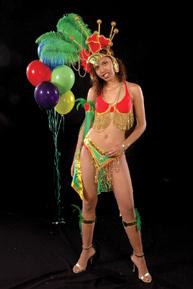


Swiss Clown made his fortune on the Music Hall stage. In the Middle Ages comical entertainers were called by a variety of names; they were jongleurs, minstrels, oculators, fools, jesters, mummers, zanies, harlequins and buffoons.


And they are known to most of us as JOKERS and so we say THE JOKER IS WILD.
e-mail:
playmas@trevor wallacemas.com www.trevor wallacemas.com
The stor y of Atlantis has always created a sense of myster y in us all. It fluctuates between fantasy, fiction and reality.
Masquerade’s 2006 Carnival presentation is a combination of all these. The stor y of Atlantis has filtered down in time through the writing of Plato, who in 370 BC was
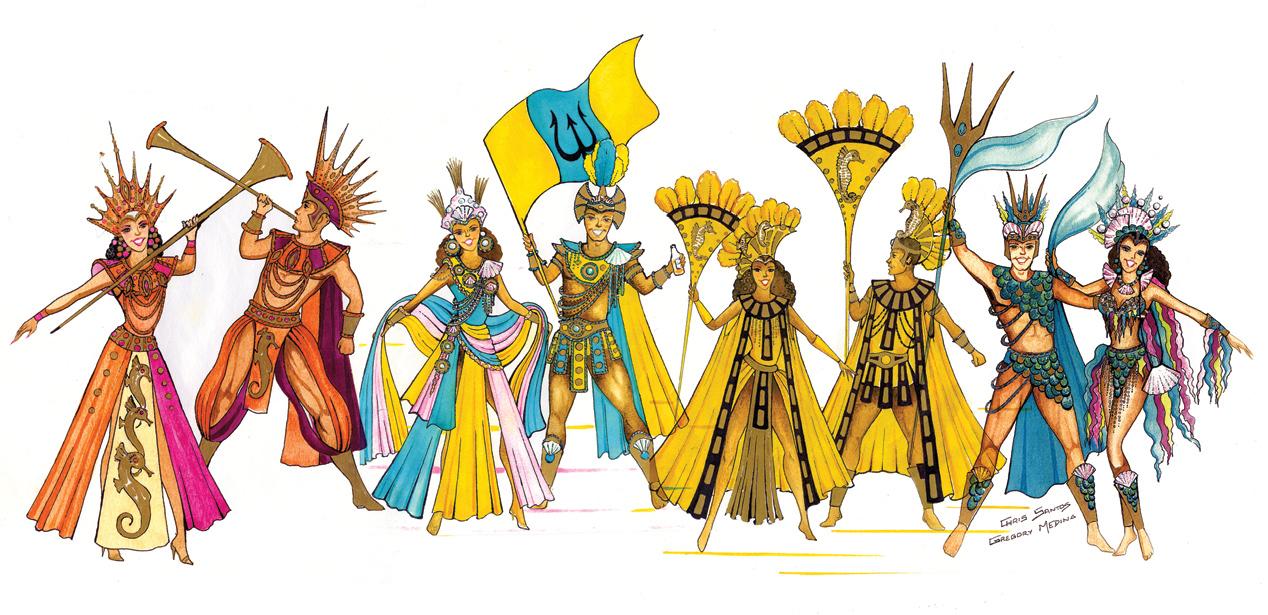
given the tale by a Greek legislator and poet known as Solon.
Soldiers of the sea, Protectors of Poseidon, Heralds, Neptune’s Treasure, Fan Bearers, Seafarers, Pearl Gatherers, Guardian of Atlantis, Sand Seekers, Sea Nymphs, Minoans, Poseidon’s Court.
Trinidad Mas Camp:
19 De Verteuil Street
Woodbrook, Port of Spain
Tel: (868) 623-2161
Email: info@masquerade.co.tt

www.masquerade@co.tt
New York
Derek Noel 718-941-0444
Miami
Carol Corridon
Tel: 561-487-2995
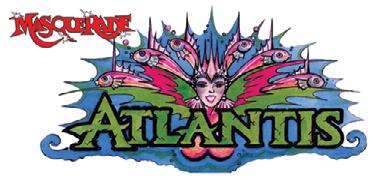
London
Dexter Khan
Tel: 011-44-208-368-9135
anticipate Carnival in gearing up to one and enjoyable mix of beautiful people, great drinks, food and music will make for a fantastic 2006 season.
Our innovative ideas, concepts and approach make you the masquerader, our central focus. Thanks to your over whelming
response, we are truly inspired to create yet another unforgettable Carnival!
Tribe invites you to journey with us in uncovering “ What Lies Beneath”... our 2006 Carnival presentation.


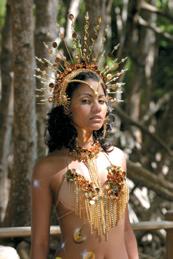



Accompany us on a magical under water voyage as we discover the allure and myster y of the deep blue sea. From coral and tropical fish to sunken treasure, Tribe has all

the riches that “lie beneath”.
Be a part of the Ultimate Carnival Experience!
Mas Camp:
20 Rosalino Street, Woodbrook www.carnivaltribe.com






Leave the world behind and Dream...
Anything you wanted to know Anyplace you wanted to go... Anyone you wanted to be...
Carnival 2006 – all you wild and wonderful Poison masqueraders will awake and embrace the visions of the beautiful bodies and the euphoric experience in a Carnival Road Party like no other DREAMS “BEYOND YOUR WILDEST”






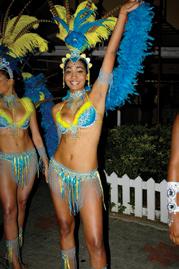

Band Leader -


Michael Headley
Communications Officer -


Meg Cheekes
Band Categor y - Large
Poison Dreams Model -


Danah Cheekes
Poison opening song -
Music and lyrics by Pelf
On the Road Music -
Live DJs & Artistes
Mas Camp: 75 Morne Coco Road, Petit Valley




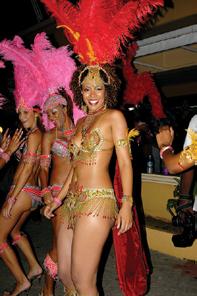
Mas camp opens from the September 09, 2005
Opening Hours 2005: Mon - Fri - 4:00 p.m. - 8:00 p.m Saturday - 11:00 a.m. - 5:00 p.m.
Tel: (868) 632-3989
Email: mascamp@poison.co.tt www.poison.co.tt
The Genesis team has designed and planned another amazing and exciting Carnival experience just for YOU–the Genesis masquerader! Come and feel the heat and glor y of this unique experience: the wonderful people, tasty food and drink – all blended together with pulsating music, and not forgetting our wildly popular rocket-man ser ver!
With creative and outstanding costumes to suit your fancy, Genesis invites you to journey with us in uncovering different festivals celebrated in some of the other beautiful countries around the world. In ever y town, no matter how big or small, a series of cultural events takes place – some religious and some cultural based on the heritage of the land.

With this in mind, Genesis brings to you Festivals, 2006, a little bit of culture and events celebrated internationally Join us for this unforgettable experience!

Mas Camp:
6 Picton Street, Newtown
Tel: (868) 622-8060 / 681-5352
Fax: (868) 622-4720
Email:
ianfusiongenesis@hotmail.com www.genesiscarnival.com





Skandal-us presents Havana 2006, which marks the band’s fifth year in Trinidad and Tobago’s Carnival. The inspiration behind the theme was to bring to a wider market the vast cultural and romantic influences that epitomize Havana, the capital city of Cuba




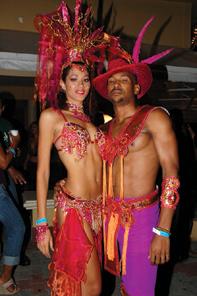



The theme paints a mosaic of L atin and Caribbean, passion and revolution, sun and sea and all the sensuality of a multi-ethnic people!
Skandal-us has made an indelible mark from its inception, as the band that revolutionized the Carnival experience and continues to offer its masqueraders an unforgettable all-inclusive package.
Mas Camp: 73 Ariapita Avenue, Woodbrook (upstairs AL ASKA Bar) Tel: (868) 622-3953 / 628-6293
www.skandalmas.com
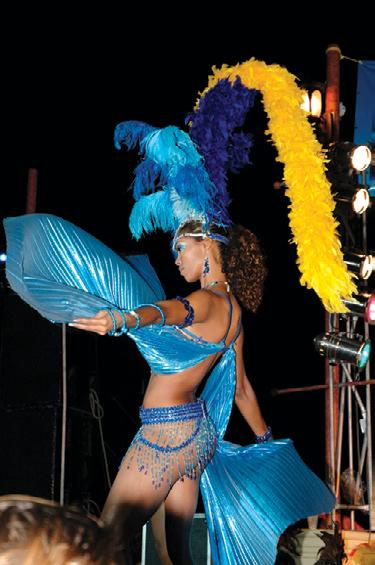



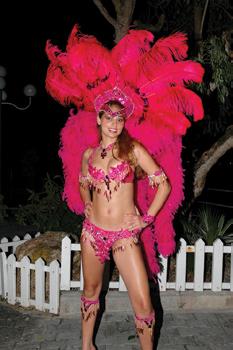





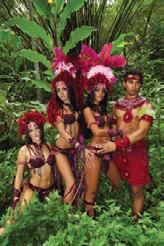
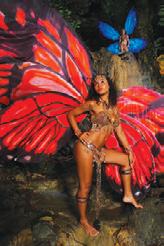




The Enchanted Forest is mystical and full of peace. It is where the sun dances with the song birds on the leaves of majestic trees!
The creative vision of Dianne Hunt, The Enchanted Forest will be brought to light by a combination of experienced designers and mas lovers. Telling a story of a magical journey (written by Danielle A. Jones), the band features the design talents of Crystal Aming-Marcus, Susan Blanc, Marlon Grant & Tisha


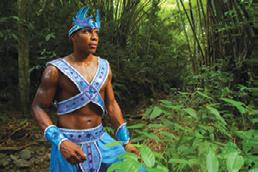
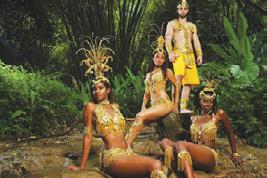
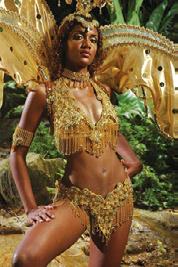







Trinidad and Tobago’s geographic location is strategic as a gateway to the Caribbean and North and South America. These southernmost Caribbean islands were once linked to South America and their rich flora and fauna reflect this. The larger of the two islands, Trinidad is only 10 km (seven miles) off the east coast of Venezuela. The islands lie south of the hurricane belt, which is particularly favourable to the yachting community Trinidad has a mountainous range running along its north coast, a flat central plain and rolling hills in the south. Tobago also has a central spine of hills with a flatter area in the south. Trinidad is 4,828 sq. km (1,864 sq. miles); Tobago is 300 sq. km (116 sq. miles). The two islands are 33 km (21 miles) apart.
The climate is tropical: warm all year and pleasantly cool at night. Average daytime temperature is 29 degrees Centigrade. The dry season runs from January to May and the wet season, from June to December. One hour ahead of Eastern Standard Time and four hours behind Greenwich Mean Time
About 1.3 million people, the majority of whom live in Trinidad. The Englishspeaking, cosmopolitan population has roots in Africa, India, Europe, Middle East and China. Africans and East Indians are the largest groups (appx. 40% each). The hospitality of its people is wellknown, as are their friendliness, charm
and love of a celebration. Places of worship cater to Roman Catholics, Hindus, Anglicans, Muslims, Presbyterians, Baptists, Methodists and several evangelical denominations.
The country is a collage of cultures that is reflected in the food, festivals, music, dance, art and traditions that enrich national life. The strong appeal of this unforgettable destination has a lot to do with its unique lifestyle. It is the home of the Steelpan, Calypso and Limbo and of course, its world-famous Carnival – the ultimate street party! Its Cuisine reflects the diversity of its people; Soca and Chutney – music as unique as the islands; Cricket – the bond that unites. These are but a few of the elements that are mixed into the cosmopolitan ambiance, making Trinidad and Tobago an experience that delights those who embrace it.
The Trinidad and Tobago dollar floats against the US dollar (appx. TT$6.3 to US$1). Automatic Banking Machines (ABMs) are available and credit cards are widely used.
Modern infrastructure and communications, 5-star hotels and fine dining restaurants, modern shopping malls. Two international airports at Piarco (Trinidad) and Crown Point (Tobago) and two fully developed seaports make the country a trans-shipment trendsetter in the Caribbean. Close to 18 shipping lines
and 12 airlines have business links with Trinidad and Tobago.
The country has the strongest and most industrialized economy in the Caribbean, and is the region’s biggest oil and gas producer with a multi-billion dollar energy industry, and a strong manufacturing sector A highly skilled and computer-literate workforce is among Trinidad and Tobago’s assets. The country has the highest direct foreign investment per capita, in the Caribbean and Latin America and is the global export leader of ammonia and methanol as well as the number one exporter of LNG to North America. Trinidad is the bustling business hub, the seat of Government and the financial centre of the Caribbean. Tobago, with its beautiful white sand beaches and unhurried pace, is the country ’s tourism capital, offering a cozy retreat for vacationers as well as the business traveller
Leisure Guide
•Beaches and watersports, including scuba diving in Tobago’s spectacular reefs and sailing ‘down de islands’ (small islands off Trinidad’s north-west coast), water-skiing and wind-surfing
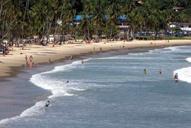
•Golfing
•Spectator Sports: Cricket, Football, Rugby, Basketball, Hockey, Horseracing
•Hiking, nature trails, eco tours, river ‘limes’, bird-watching
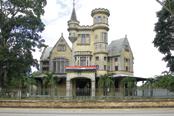

•Nightlife includes casinos, pubs, public parties, cultural shows
•Art galleries
Play Mas ’06 is a sample of Trinidad and Tobago’s Carnival – its colour, creativity and diversity Whether you are a regular visitor to our country, or it is your first time, we feel sure that the information here will enhance your Carnival experience.
Many people contributed to Play Mas ’06, in various capacities. Together, they combined design with writing skills; mixed business savvy with persuasive promotions; networking with support from costume designers, photographers, artistes, promotional agencies and other organizations associated with producing this wonderful show that is Trinidad and Tobago’s Carnival. Our advertisers’ faith in this magazine is truly appreciated.
The dedication and support that went into making Play Mas ’06 possible are, without a doubt, testimony to our love for our country ’s culture. To all who played a part – thanks!
Ever y effort has been made to ensure accuracy in this publication. Prices and venues are subject to change. No material can be reproduced in any form without written permission of the publisher
Photographers: Bertrand De Peaza, carnivalscene.com, triniscene.com, Betty Agostini

Writers: Quincy Ross, Roger Israel, Deborah Samaru, Pat Isman, Michael Anthony, Lisa Wickham





Design/L ayout: L arr y Cashie
Illustration: Kenneth Scott, L arr y Cashie
Co -ordinator: Yvette Louison





Sales: Nicole Freakley, Lisa Wickham
Executive Producer: Tourism Development Company Limited
Producer: The ArtBank, E Zone Entertainment


Printer: Scrip- J Printers
Distribution (local and international): Tourism Development Company Limited